Solo female travel anywhere and everywhere.
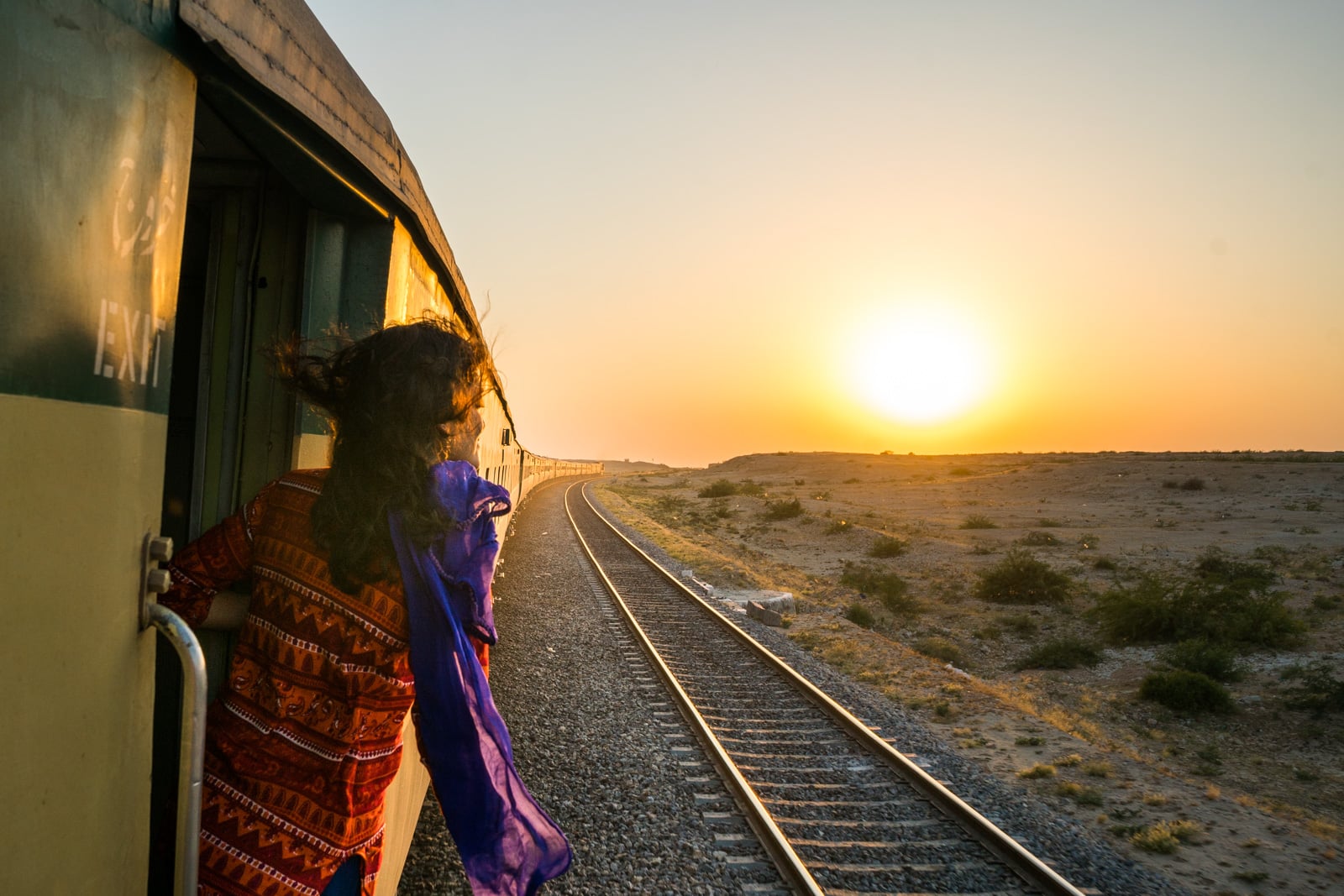

First timer’s guide to train travel in Pakistan
Updated in 2020: A complete guide to train travel in Pakistan. Includes all the information you could possibly need to make your journey as pleasant as possible.
It might not look it on a map, but Pakistan is huge.
Luckily, for travelers and locals alike, it invested heavily in infrastructure, making traveling around relatively straightforward. Buses zip between major towns and cities, and there’s always some form of local transport to be found. In the northern part of the country, Jeeps and minibuses (“coasters”) reign supreme. But if you’re traveling in the center or south— especially if you’re traveling long-distance—nothing beats a good ol’ train trip.
Pakistan’s rail network stems from the British colonial days… and not much has changed since then. Older trains have rattled on since the English assigned them to the rails, and the fortress-like stations still stand strong. Train tracks throughout the country lie deserted, though Chinese investment might soon revamp them.
However, Pakistan’s rail network is still extensive, and traveling by rails is a quintessential South Asian experience. Unfortunately, traveling by train can be a bit confusing: there are different classes, different types of names, erratic ticket offices and timings, dozens of stations… and then some!
But travelers can now rejoice! I’ve created this complete guide to train travel in Pakistan just for you, so you won’t have to go through all the trouble I had to go through when I first traveled in Pakistan.
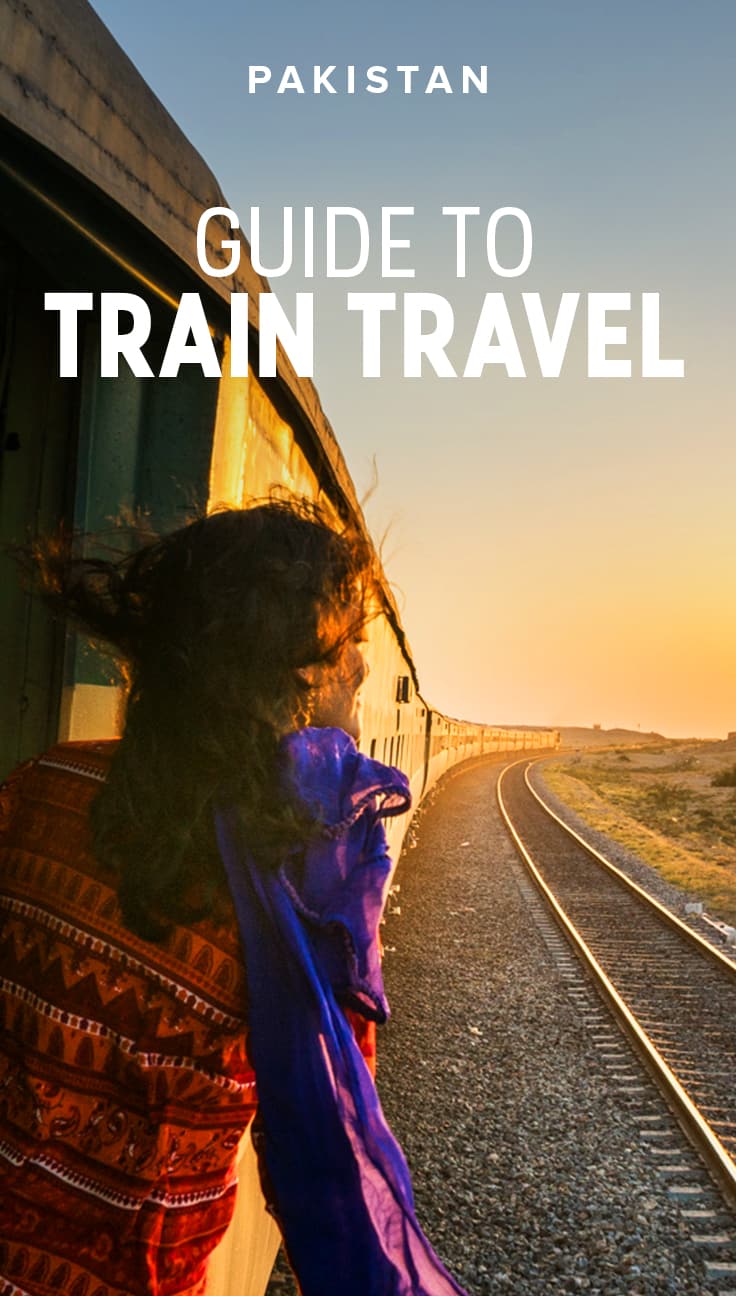
Lost With Purpose’s guide to train travel in Pakistan
- Finding the right train
Types of trains
- Train classes
- Buying a ticket
- Female safety
- Electricity and charging
- Food and drinks
- Keeping your ticket
- Packing list
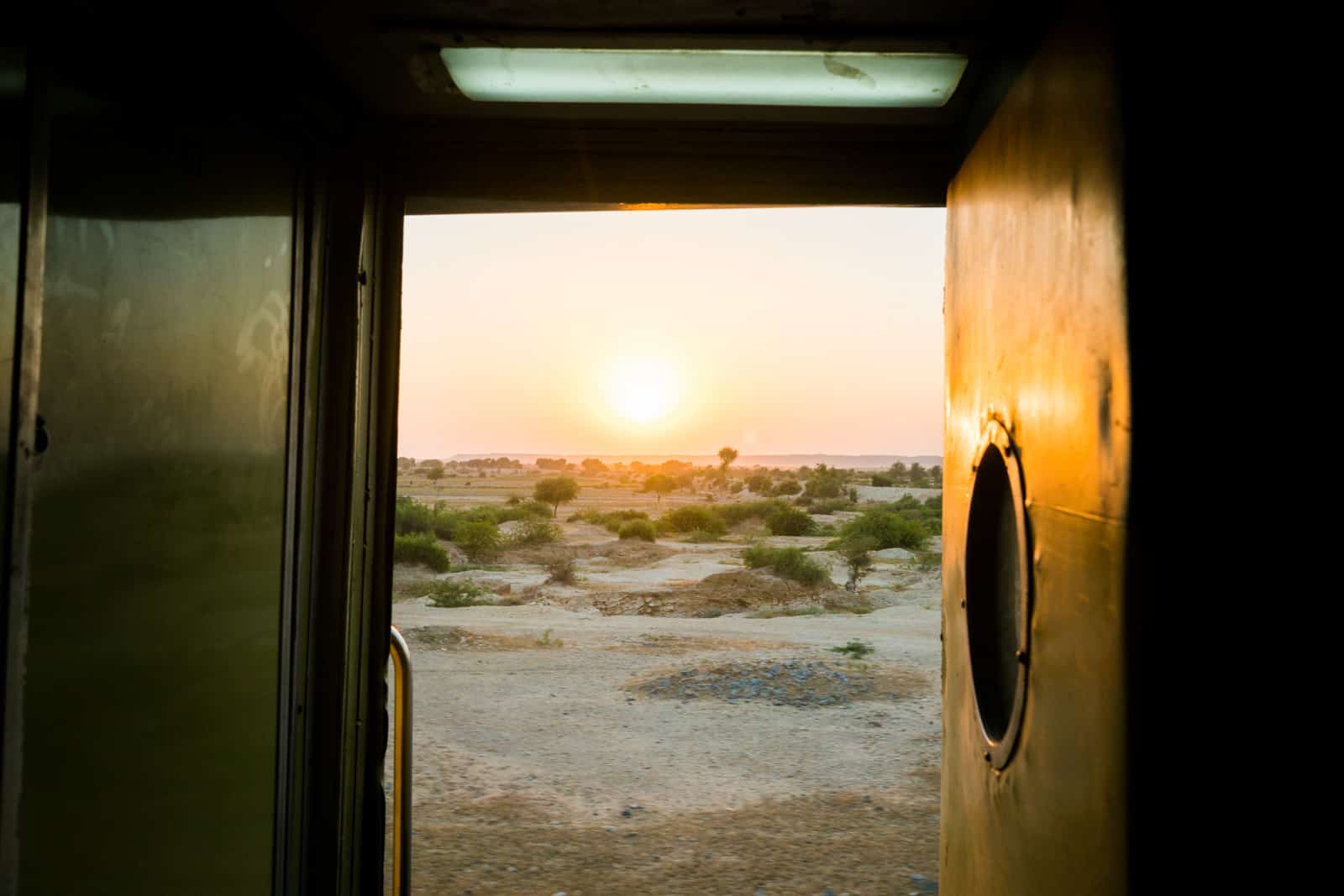
The deserts of Sindh make for some epic desert sunsets!
Finding the right train in Pakistan
First things first: if you want to travel by train, you need to find the right train for your journey.
To do this, go to the website of Pakistan Railways. Here, you’ll be able to find your train under the “plan your journey” section of the page. Although getting to the information you want is a bit roundabout, the process of navigating the website is rather self-explanatory. If the website is working, that is.
This route map gives a good indication of all the railway lines in Pakistan:
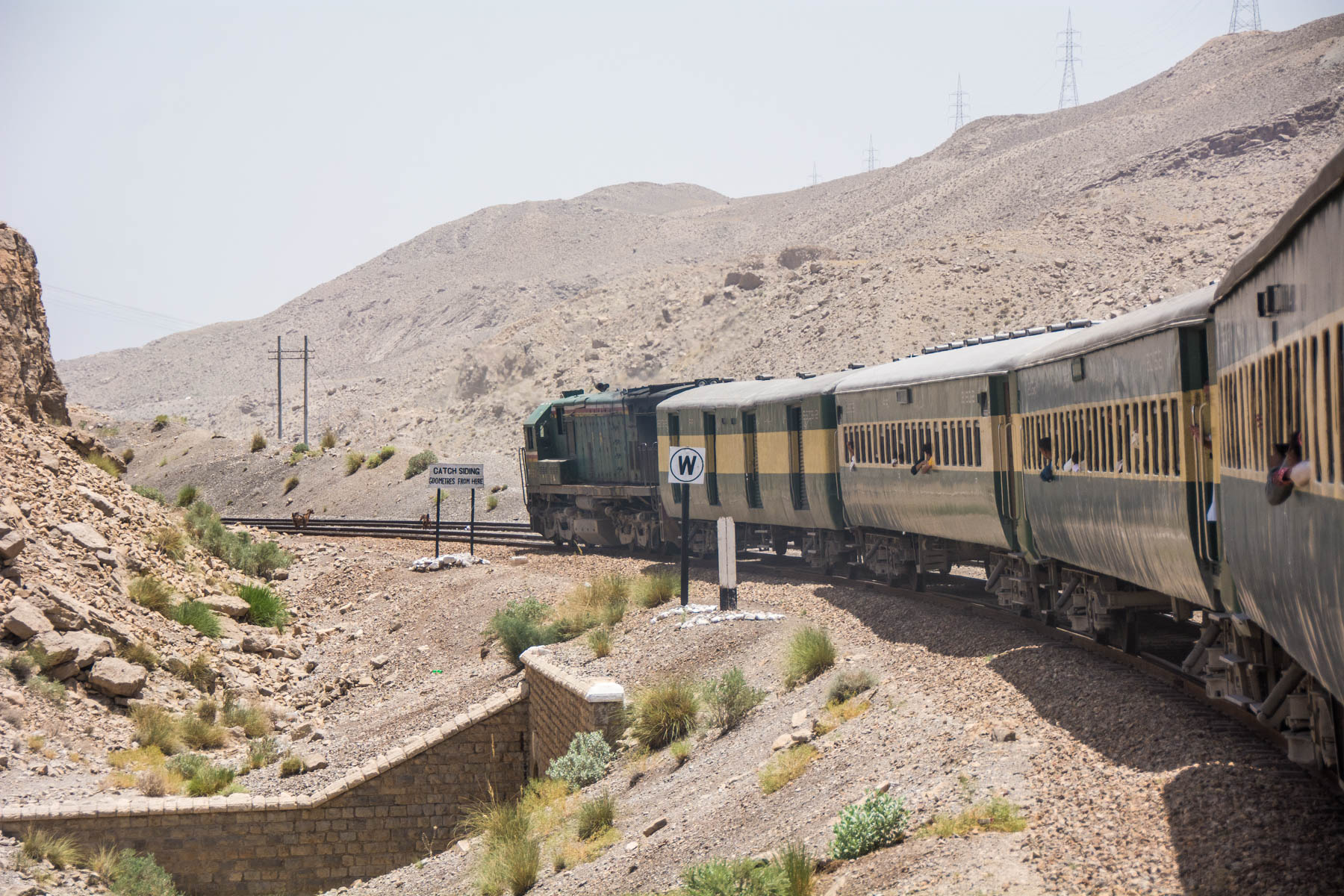
Riding the Bolan Mail to Karachi at the end of my Iran – Pakistan border crossing adventure
There are several types of trains. From the business class Green Line train between Karachi, Lahore, and Islamabad, to the historic—but less than comfortable—Bolan Mail between Karachi and Quetta. On some routes there is only one train, on some routes there are several.
Some trains stop at almost all train stations along the way, and some at only a few. Unfortunately, the names of the trains aren’t always indicative of how long a train journey will take. For instance, the Awam Express between Lahore and Karachi takes more than a day, while the Business Express on the same line takes roughly 17 hours. Clearly the meaning of “express” is fluid in Pakistan.
Luckily, the Pakistan Railways website indicates how long each train journey should take, and you can make your choice depending on that metric. As a rule of thumb, the slower the train, the cheaper (and often less comfortable) it is.
Note: Times given on the Pakistan Railways site are estimates only . Trains in Pakistan are usually late, and it’s not uncommon for your train journey to take several hours longer than indicated.
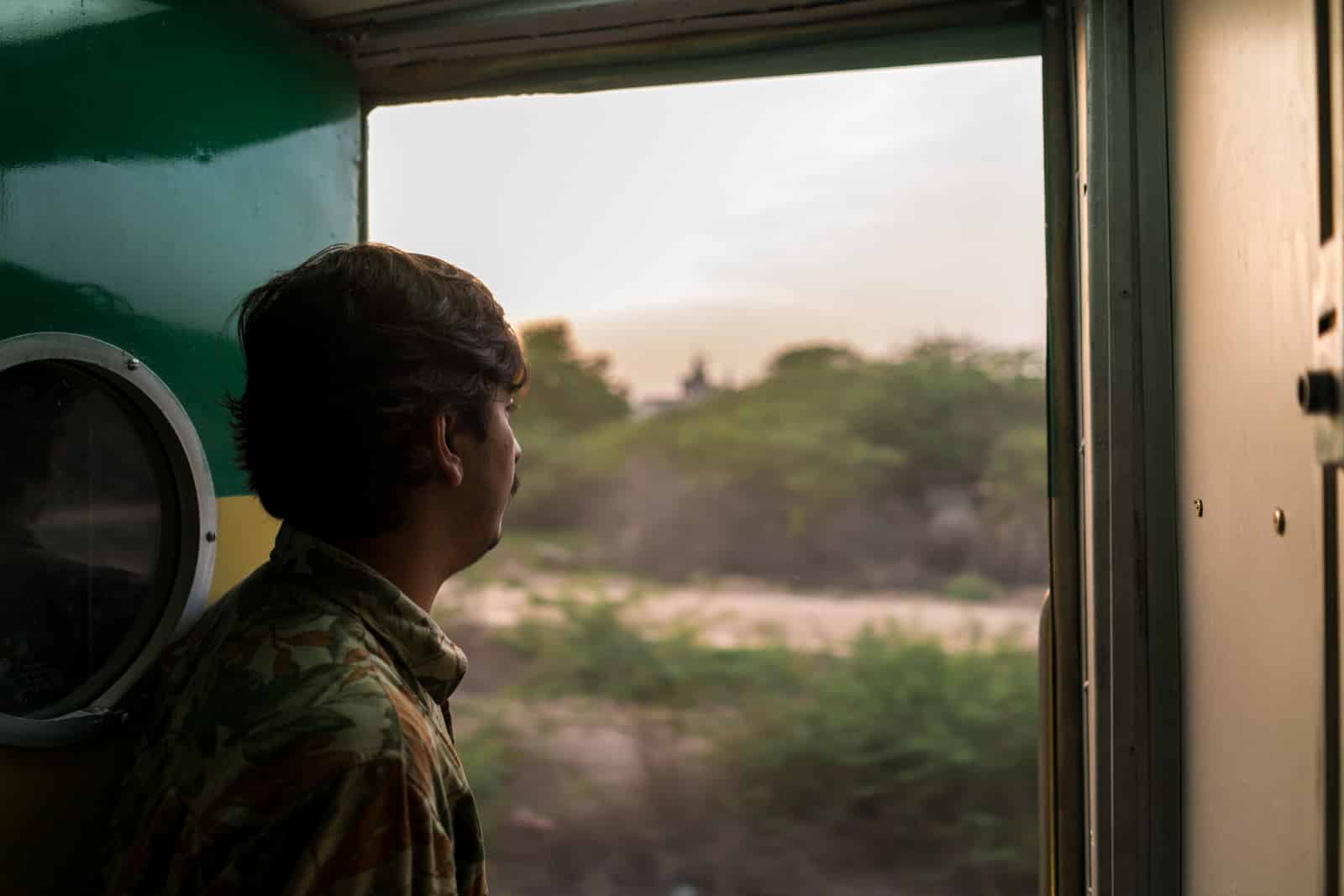
My favorite part about trains in Pakistan: being able to enjoy the views from open doors.
Train class types
Pakistan Railways offers seven different classes on its trains. Not all trains will have all seven; most have two or three classes available.
The classes are divided as follows:
ACSL – AC Sleeper
Pc – ac parlour car, aclz – ac business.
- ACL – AC Standard
- ISL – First Class Sleeper
EC – Economy Class
Sec – second class.
Doesn’t mean anything to you? No worries: I know these names don’t clarify very much. Here’s what you can expect from each of the Pakistan train classes:
The highest and most expensive class. AC Sleeper class is comprised of private compartments, each shared with one to three other travelers. The compartments contain two to four long bunks that can be used as both bench and bed. Bring a blanket, as the AC can actually get too cold.
In this class, the train windows don’t open, and you won’t see many (if any) outside people walking up and down the train selling snacks and chai—all tea and food service is managed by the train staff.
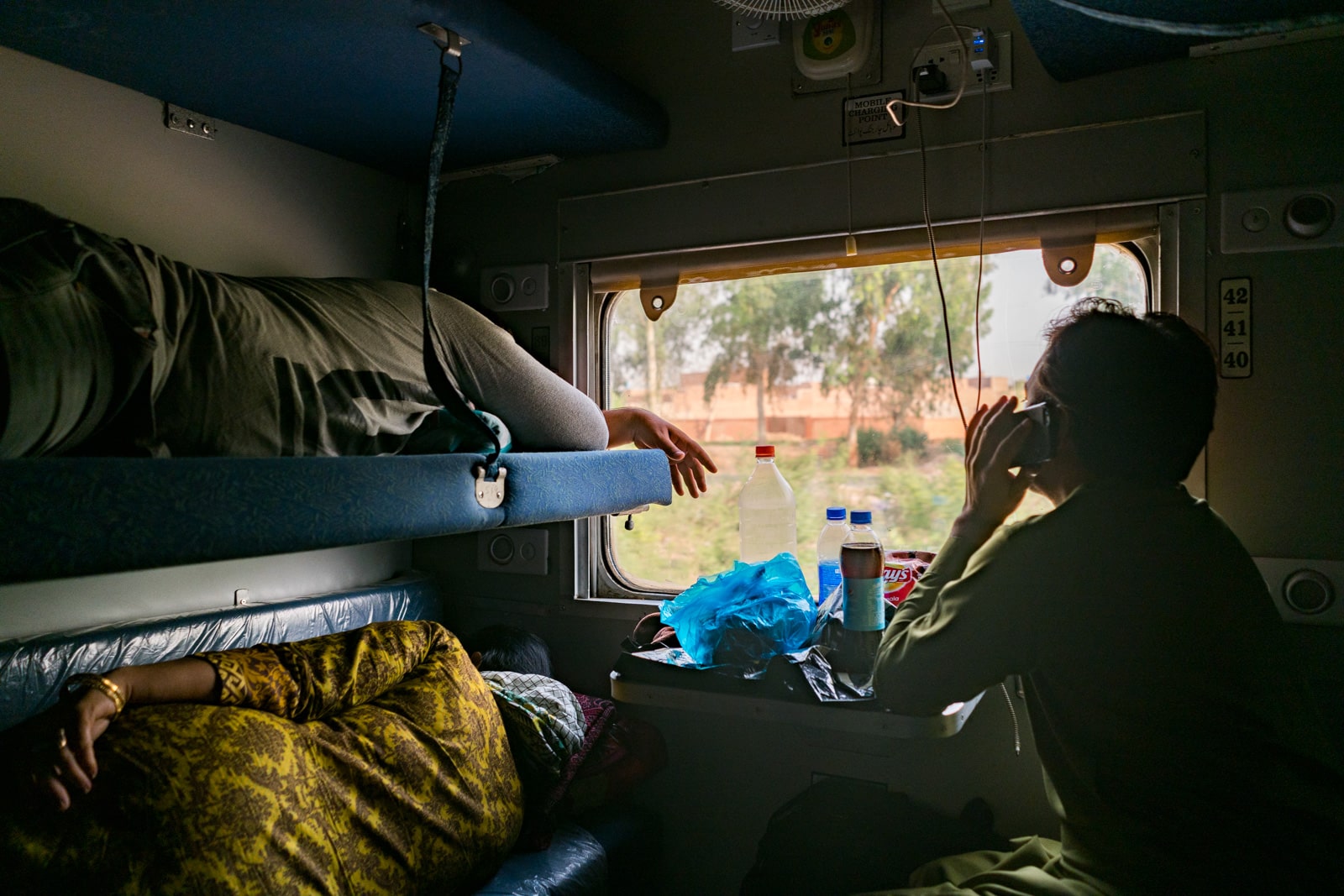
Inside an AC Sleeper class cabin
Comfortable AC chair class, reminiscent of European commuter trains. Not recommended for long journeys, as the seats don’t really recline.
Similar to the luxurious AC sleeper class, but shared with more people. Each closed compartment houses six travelers in total.
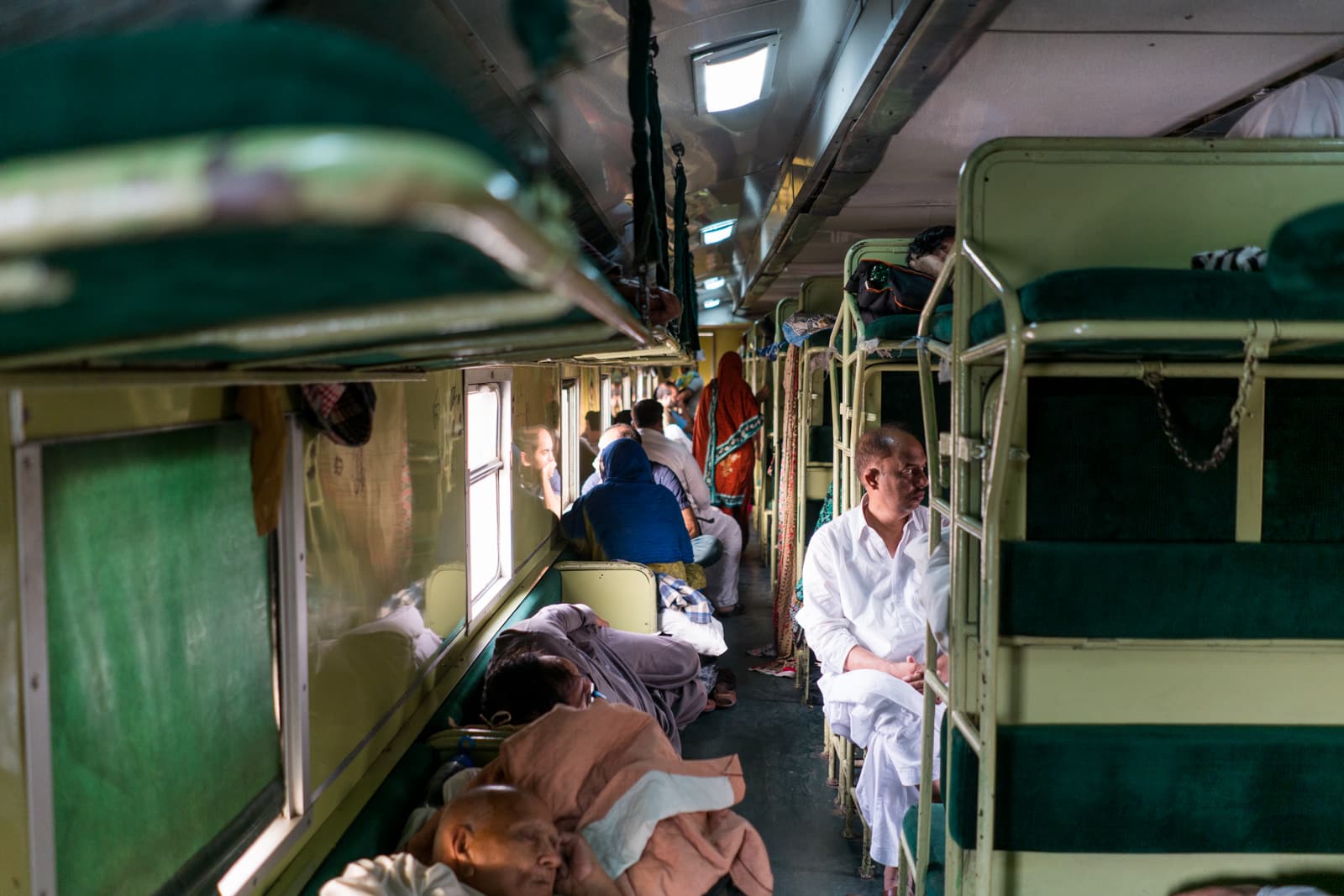
Typical AC Standard scenes
ACL – AC Standard
Sometimes known as “AC Lower”, this class depends on the train. On short rides, this class can be compared to riding on a bus with AC. On longer rides, this class will have bunk berths for sleeping.
The sleeper train cars have an open layout, divided into sections. Each section will have six bunks to the side, and two bunks along the aisle.
ISL – First Class Sleeper
Standard sleeper type compartment with an open berth style coach. Meaning, arrangements of open compartments with 6 bunk beds, and upper and lower bunks running along the path through the train car. No AC.
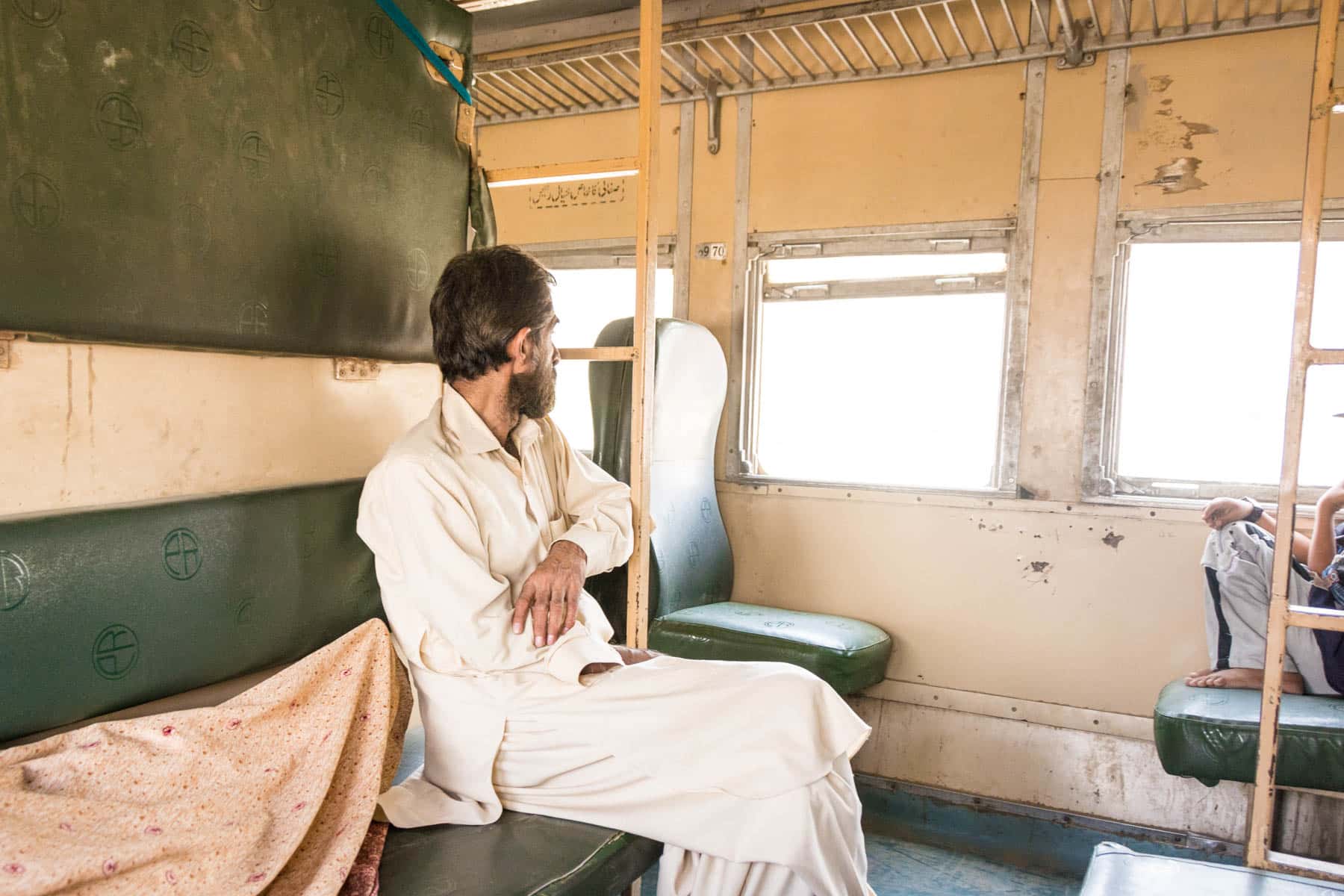
In Economy Class (EC), some seats are for sleeping, others only for sitting
Similar to First Class Sleeper, but the seats to the side are only for sitting, not sleeping.
Standard train seating arrangements. Don’t be surprised if you spot people sitting and sleeping on the floor.
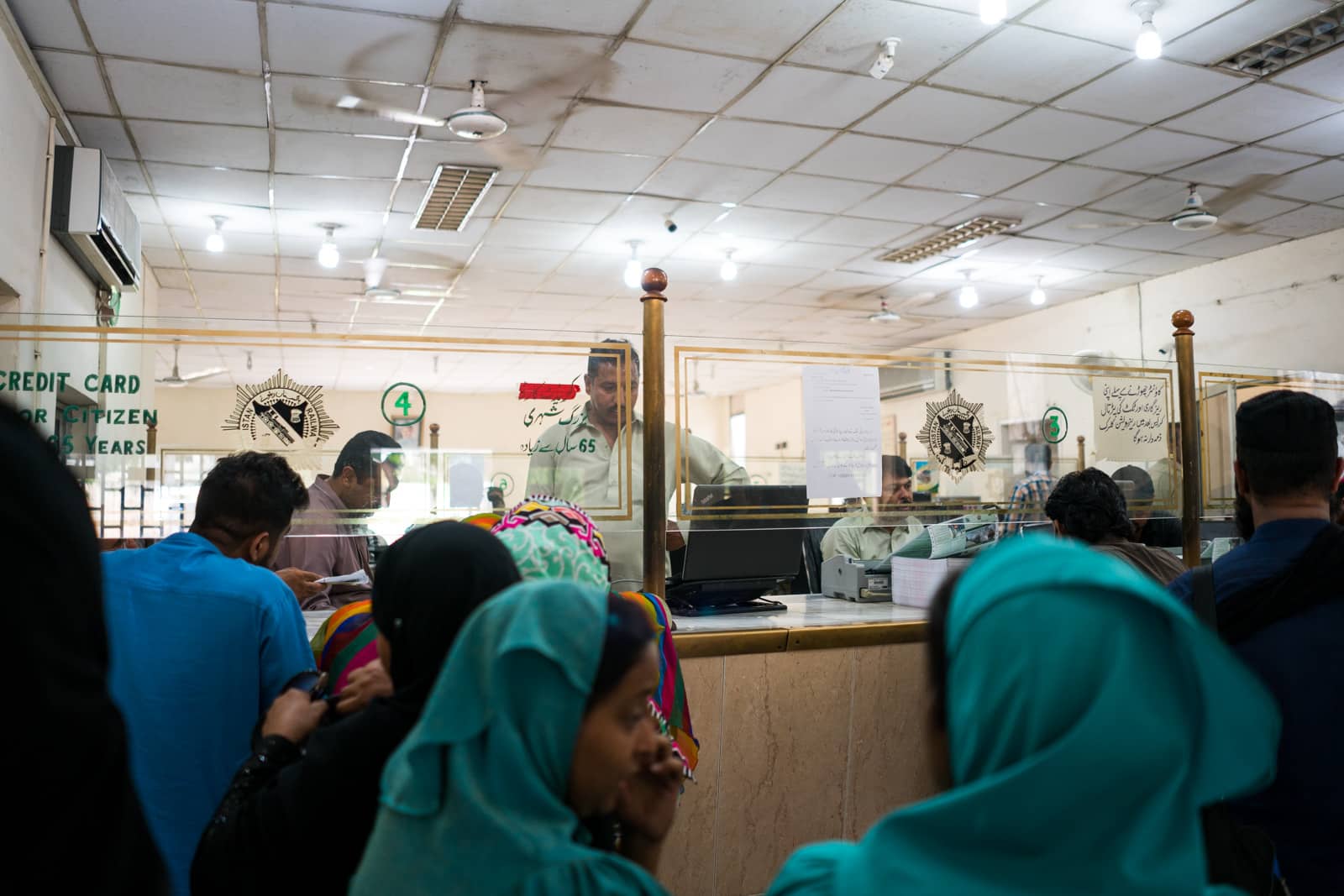
Queueing up for tickets in Rawalpindi
How to buy a train ticket in Pakistan
Now that you have a solid idea of the train and class you want to take, it’s time to buy a ticket!
Although it’s theoretically possible to buy tickets online—I personally do, though it often involves much frustration—many still buy train tickets at the train station, ticket office, or with a travel agent.
In smaller towns and cities, you can usually only buy tickets at the train station. In bigger cities, there are also ticket offices. Make sure to bring some patience, as ticket offices can get busy.
Buying Pakistan train tickets online
Tickets can be purchased online with the help of a local friend. You can book tickets via the Pakistan Railway website and Android app .
To buy tickets you have to set up a Pakistan Railways account, for which you need a CNIC (Pakistan ID document number). If you’re a foreigner, using your own passport number doesn’t work—you need a local friend to sign up using their CNIC and other information. Tickets can only be paid for with a Pakistani debit or credit card. No foreign cards.
You also need a CNIC number to book a train ticket. Never fear, you can travel using tickets purchased with someone else’s CNIC ; it’s common practice when heads of family purchase tickets for other family members.
If someone buys your ticket for you, make sure to bring a copy of the ID card of the person whose CNIC number you used (unless you travel with that person, of course!). Conductors will likely ask for a copy to cross-reference their data with the CNIC number of the person who booked the ticket.
Know that buying tickets from the Pakistan Railways website isn’t always straightforward; I’ve had it take four or five tries (and a lot of swearing) before the booking went through. It’s also not possible to get any foreigner discounts when booking online.
Protip: It’s possible to get a 25% – 50% foreigner discount when buying a train ticket. Check this article on how to get a discount on train tickets as a foreigner.
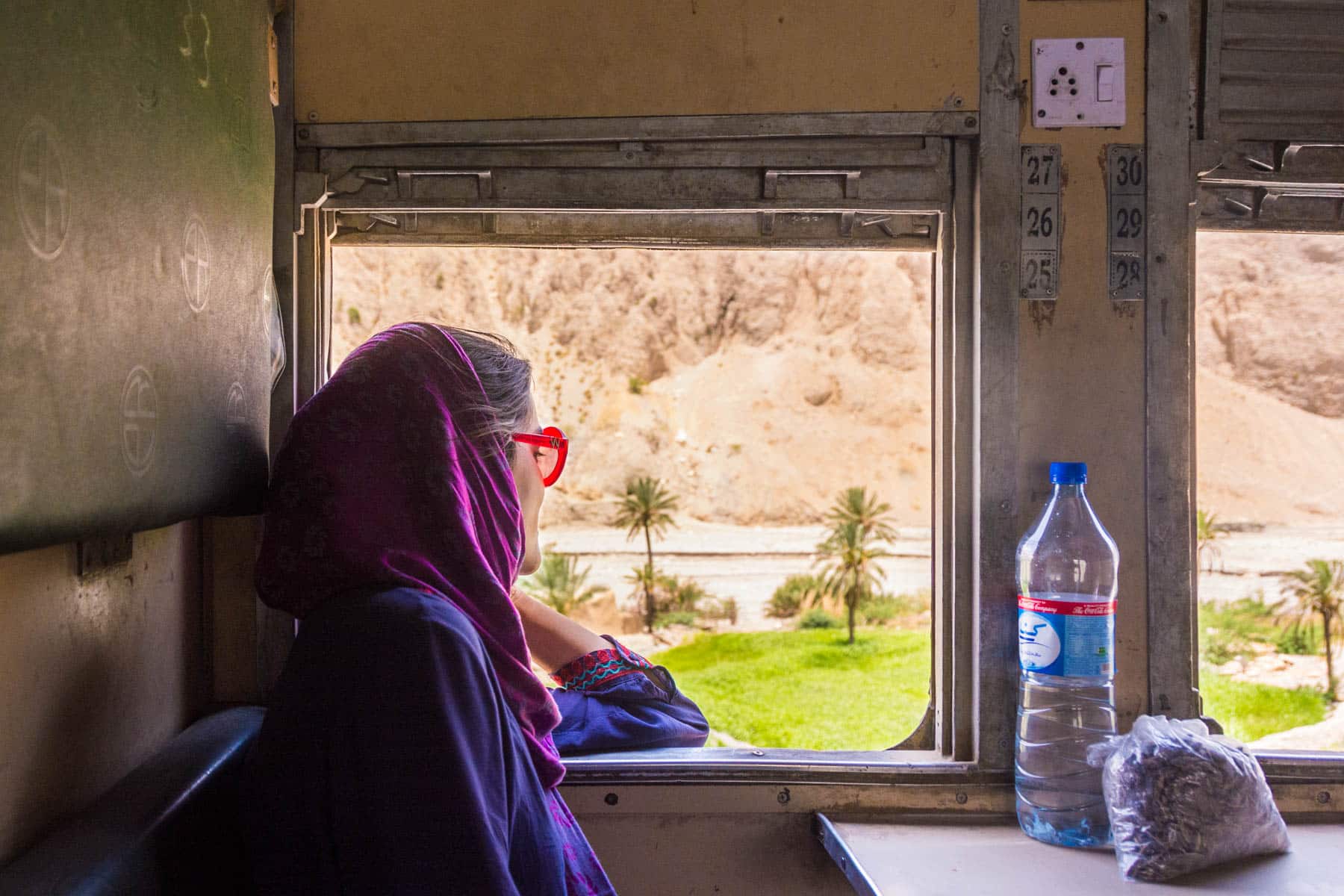
Feelin’ classy… in the lowest train class.
Female safety on trains in Pakistan
Unfortunately, female safety in Pakistan is always an important consideration. As it is anywhere in the world.
Don’t worry about being kidnapped or anything; creepy men touching you is generally the biggest risk in the train. Luckily, there are a few things you can do to mitigate the risk of something happening:
When booking a train ticket, choose for the middle bunk when riding in the open-plan cars. On Indian trains, I always went for the top bunk, as there are dividers between each section. However, I recently had an unpleasant encounter on the top bunk during a train trip to Karachi where there was no divider. Next time, I’m going for the middle bunk—it’s more secluded.
Be wary of closed compartment cars (higher class) if traveling alone. Though they might seem safer from prying eyes than the open seating plans, but if you get stuck in a compartment with only men as travel companions, things could get uncomfortable.
Buddy up with women and families around you. They’re often protective of female travelers, and likely will take care of you. Men are much less likely to do pull stunts when other women or families are watching.
If something happens, call a conductor or police officer. You’ll see them wandering around the trains, and they can take care of the situation if anything unpleasant occurs.
Tip: There are women-only sections on trains. If you’re a a female traveler(s) and you feel uncomfortable, you can ask the conductor to move you to the women’s section of the train—or a safer section of the train—free of cost.
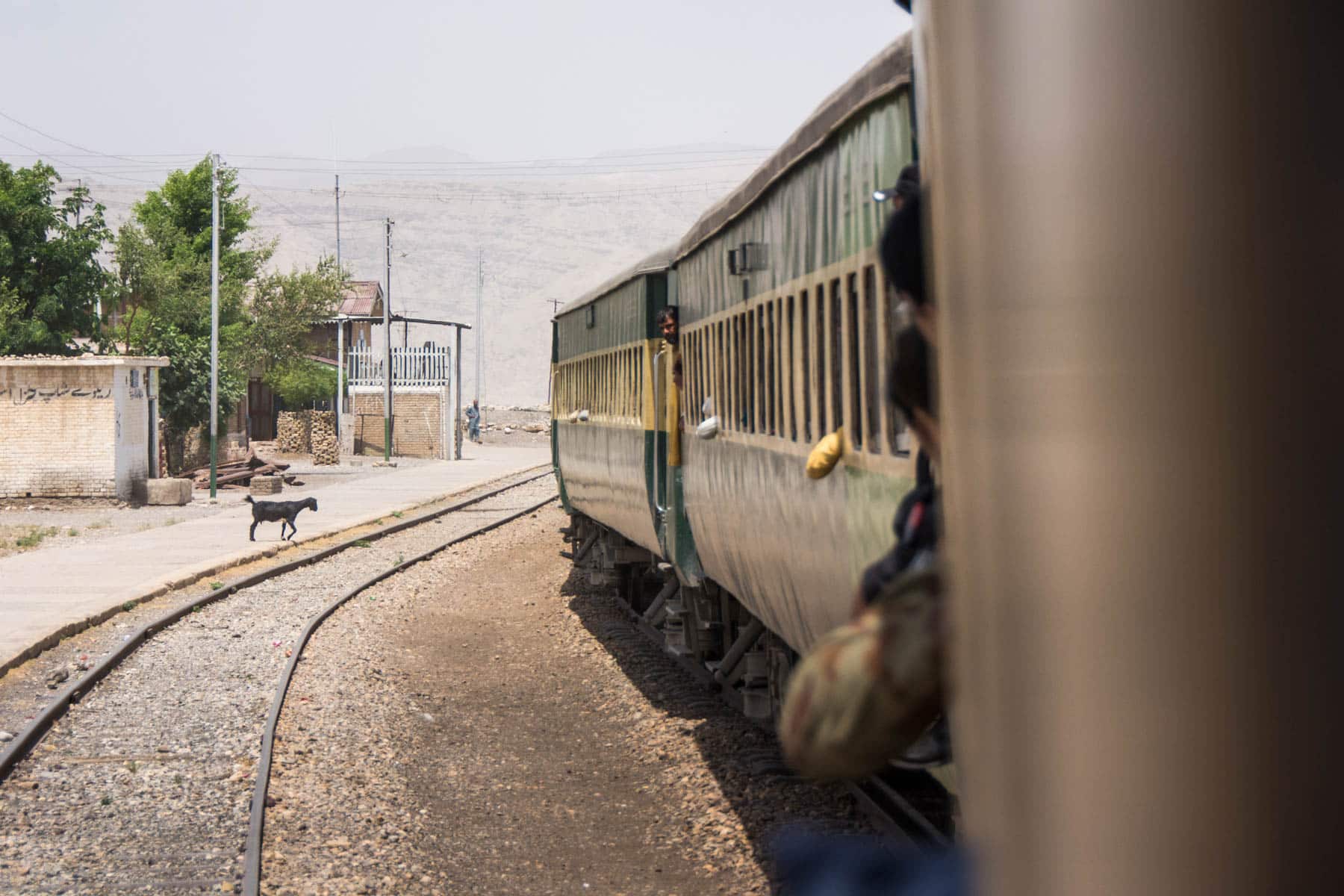
Goaty McGoatface trying to board the train
Tips on train travel in Pakistan
Boarding the train.
Some trains have information written in English on their exteriors, but many trains only have information in Urdu. If you’re unsure about which train to get on, just ask. A station employee, security person, or friendly local will be sure to help you get on the right train.
At major stations, trains will stop for an extended period of time (anywhere from 20 minutes to an hour), so no rush if you want to get out, stretch your legs, and quest for pakora on the platform. Just keep an ear open for the train whistle, signaling it’s time to go.
At minor stations, however, the train will only stop for a few minutes, enough time to unload old passengers and bring on the new.
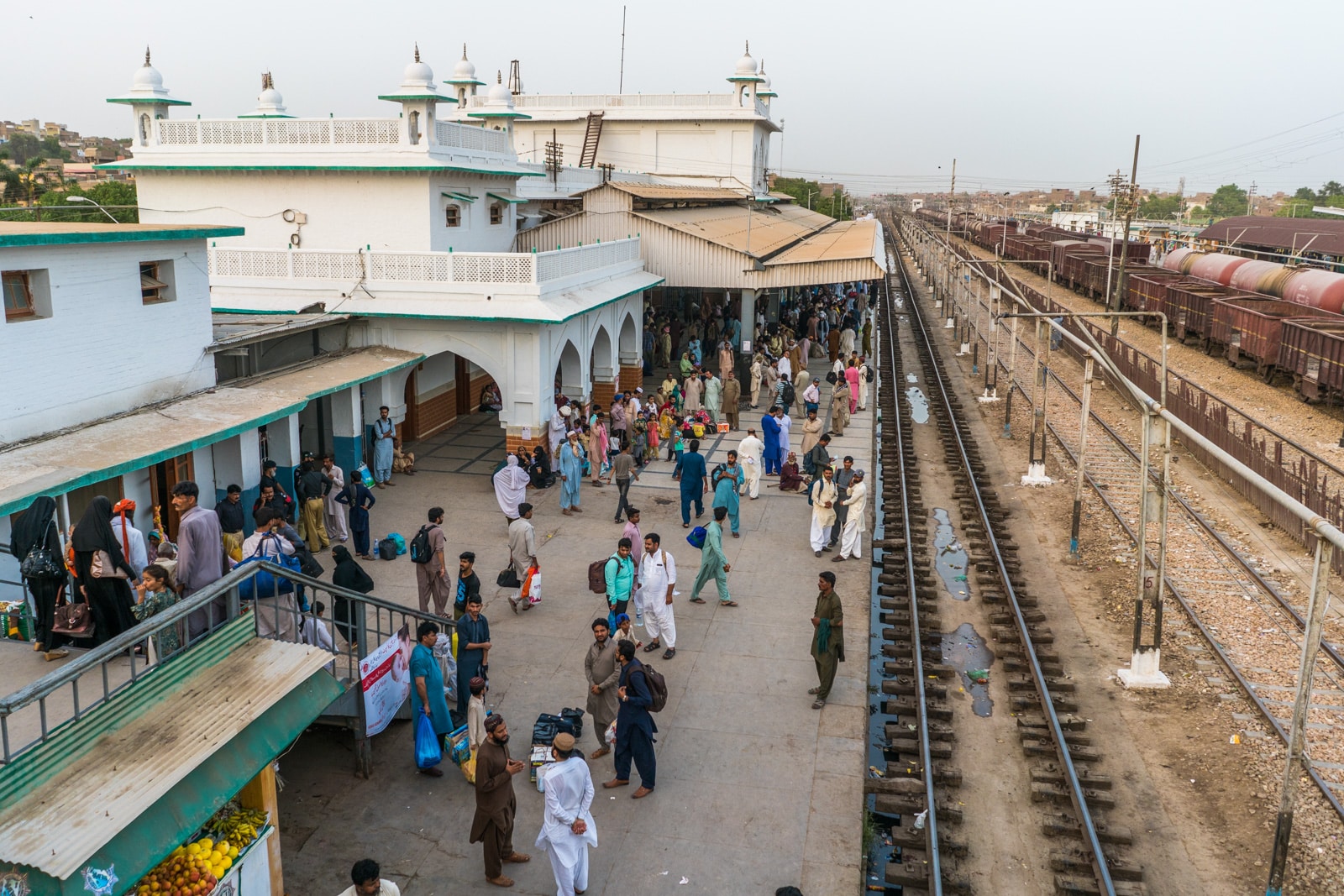
Waiting for the train in Hyderabad
Electricity and charging in the train
Starting at AC Standard class, there will be power plugs available (for round, two pronged plugs). However, unless you’re in the highest class, there are usually only a few outlets in each coach. Electricity does go out at times. Load shedding in the train, perhaps?
Of course, this depends on the train—nothing is consistent in Pakistan. For long journeys, make sure to bring a power bank. Even if you don’t use it, someone else surely will.
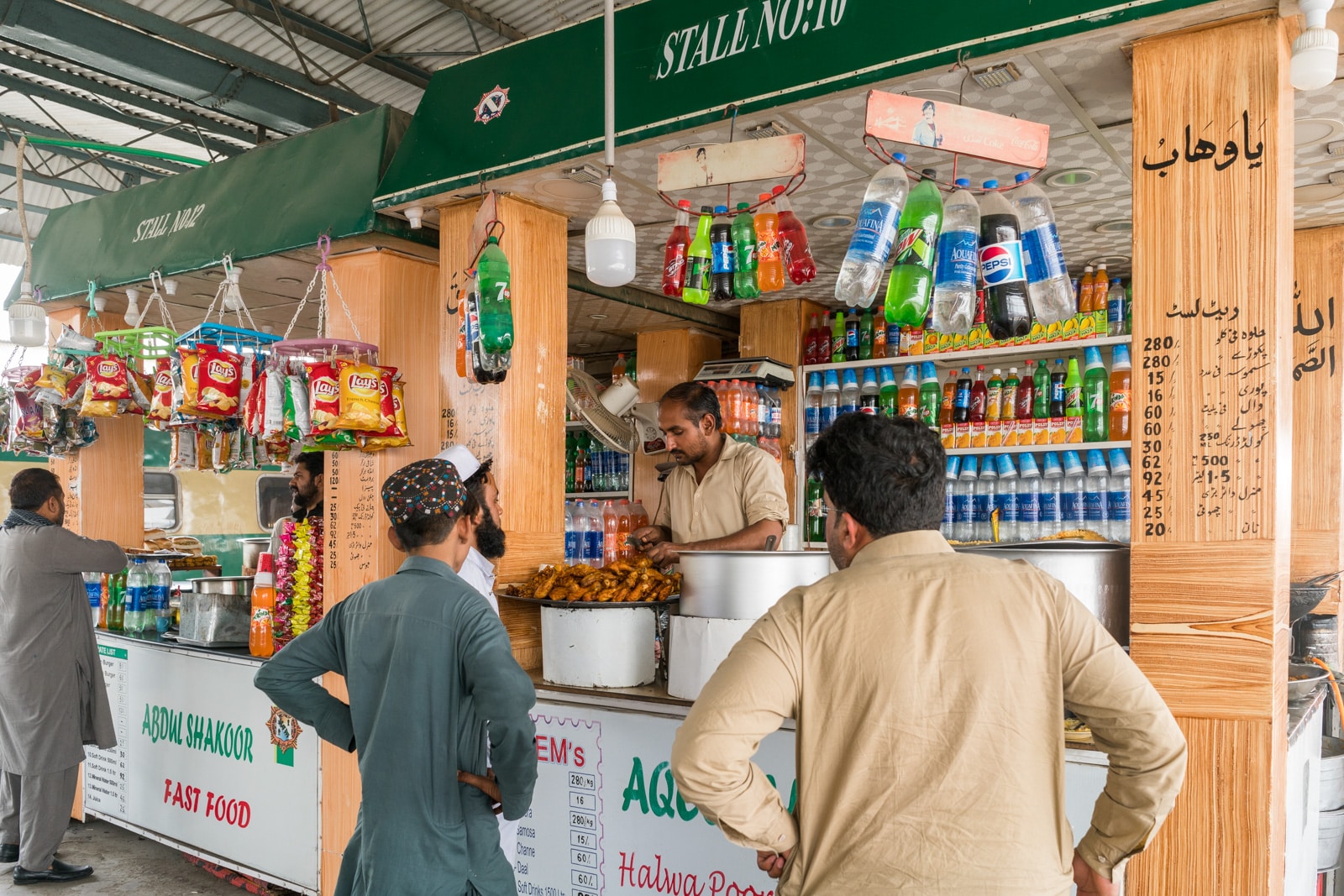
Food stall at a busier train station in Sindh
Food & drinks on the train
Although there are juice, chai, and food wallahs walking up and down the lengths of the trains, most people bring their own supplies. Don’t be surprised to see porters carrying in bags, buckets, or boxes stuffed with food for families!
The food served on Pakistani trains is notoriously bad and dirty , and stations where you’ll stop long enough to find food are sometimes hours and hours apart. Packing some snacks for the train ride is a good idea; it’s also cheaper (and probably cleaner) than buying food en route.
Note: Good luck finding trash bins on the train or at the stations. Though people generally use the great outdoors as one giant trash heap, please resist the urge. Bring along something to collect your waste in and dispose of it in a bin once you reach your destination.
Toilets on the train
As you would expect, toilets aren’t in the best of conditions. They’re guaranteed to get progressively worse as the journey continues.
Make sure to bring anti-diarrhea medicine in case you ate some bad food the day before your journey, and hand sanitizer for after you emerge from the toilets. At this point, I’ve gotten sick several times from not washing my hands before eating on the train.
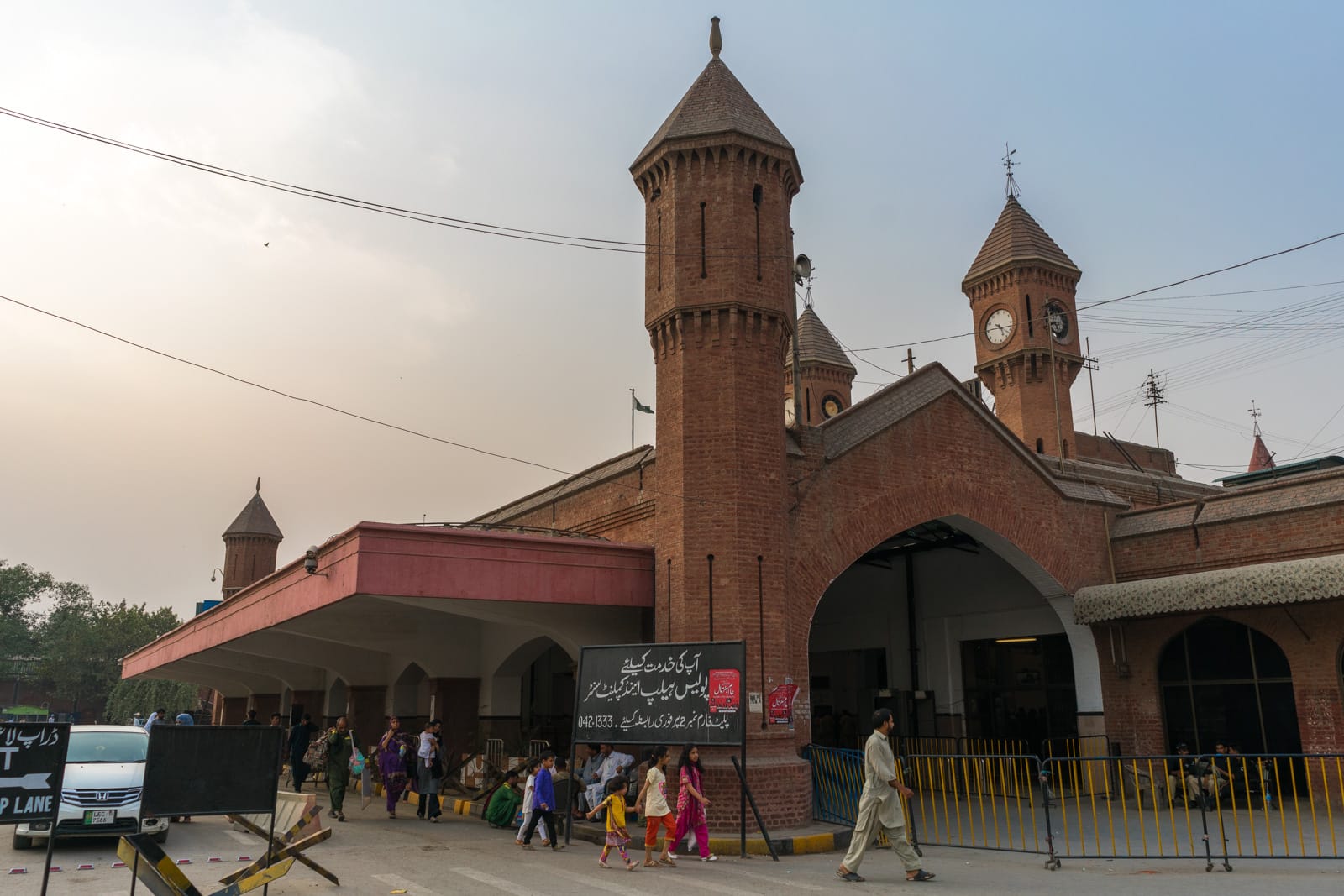
Fortress-cum-railway station in Lahore (but really)
Safety on the train
Safety in Pakistan is always a concern. Use common sense when on the trains: don’t leave valuables unattended, be wary of other passengers, watch your bags, etc. I recommend putting a bag with your valuables at the end of your bunk or seat, and using it as a pillow while you sleep.
Though most people have good intentions and will take care of you, people keep warning me about this particular point so it’s worth a mention:
Sometimes people drug food, then offer it to other passengers so they can take advantage of them later on. Though this is more commonplace in touristic destinations in India, rather than Pakistan, it doesn’t hurt to stay vigilant. Use common sense and trust instincts when accepting food and drinks from other passengers. If someone is looking shifty or uncomfortable, don’t hesitate to reject their offer.
Keeping your train ticket
Once you arrive at your destination, you’ll be asked to present your train ticket upon leaving the train station. Make sure to hang on to your ticket if you have a paper ticket.
Lost your ticket? You can feign foreigner ignorance, though in 2016 I had some trouble getting out of the Bahawalpur train station without my ticket. In the end, I just gave the guy a piece of paper saying that it was the folded ticket, and walked away before he could say anything else.
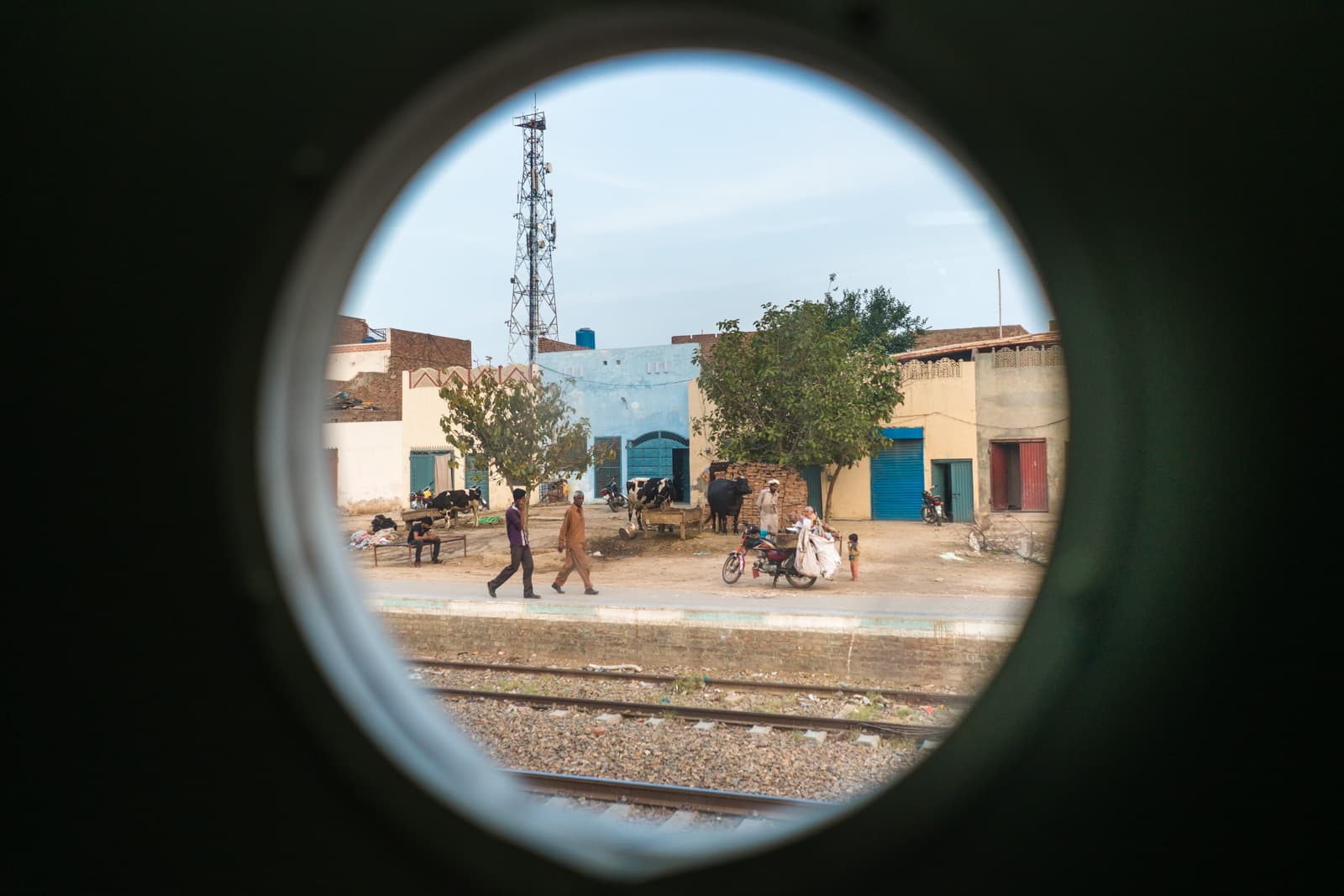
Watching the world go by at a station in Sindh
Pakistan train travel packing list
In case you’re list-oriented, here’s a quick packing list to ensure your train journey goes as smoothly as possible.
- Your train ticket, of course!
- Hand sanitizer for the toilets
- Bag or container for trash
- Snacks and water
- Power bank for charging if/when power is out
- Lightweight blanket or sleeping bag for overnight journeys. It can get cold!
Safe travels, and enjoy your train adventures!
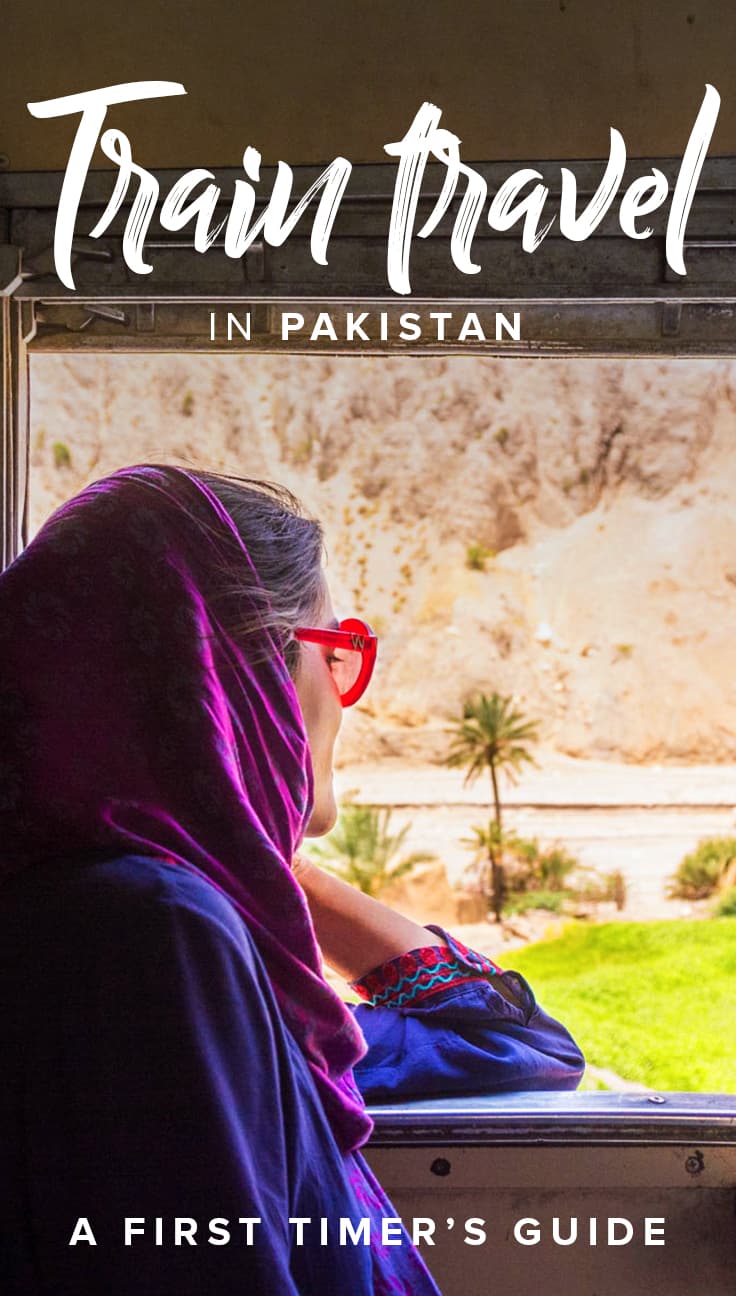
Want more practical Pakistan travel tips? Don’t miss this Pakistan travel guide !
Yay transparency! There are some affiliate links in this post. If you buy something using my links, I’ll make a bit of change at no extra cost to you. Think of it as a way of saying thanks for providing the information. Profits may or may not go toward ice cream on my next sweltering train trip.

Alex Reynolds
33 thoughts on “ first timer’s guide to train travel in pakistan ”.
How can I bring chicks through Pakistan railway with me
Ghulam bhai, you can accomodate them in live-stock compartment
Ac sleeper me max kitne persons allow hote he
can you please inform me freedom pass for older persons are allowed in Baba Freed Express Vehari to Karachi or not
Can you have sex on train?
I am sorry to say that i will never travel pakistan in my life because there is no any agreement between India and Pakistan for travelling.
Leave a Reply Cancel reply
Your email address will not be published. Required fields are marked *

- Privacy Overview
- Strictly Necessary Cookies
This website uses cookies so that we can provide you with the best user experience possible. Cookie information is stored in your browser and performs functions such as recognising you when you return to our website and helping our team to understand which sections of the website you find most interesting and useful.
Strictly Necessary Cookie should be enabled at all times so that we can save your preferences for cookie settings.
If you disable this cookie, we will not be able to save your preferences. This means that every time you visit this website you will need to enable or disable cookies again.

The Man in Seat 61
A beginner's guide to
Train travel in pakistan.
- Buy train tickets
- Buy ferry tickets
- Book a hotel
- Privacy & cookies
- Home
Train travel UK & Ireland...
Train travel in europe..., train travel in asia..., train travel in africa..., train travel in america..., train travel in australasia, taking the train in pakistan.
Useful country information
What are pakistani trains like, classes of accommodation.
AC Sleeper class (ACSL), air-conditioned berths in 2 & 4 berth compartments;
AC Business class (ACLZ), air-conditioned berths in 6-berth compartments;
AC Parlour car (PC), air-con open-plan seating, recommended for daytime journeys;
AC Standard class (ACL), also known as AC Lower, air-conditioned open-plan berths;
First class sleeper (ISL), berths in open-plan carriages, often grubby, not air-con;
Economy class (EC), not air-con, open-plan seats & berths, you can pay for a berth or a seat;
2nd class seats (SEC), basic seats in crowded open-plan carriages, not air-con.
You can check train times and availability at the Pakistan Railways site, www.pakrail.gov.pk .
AC Parlour car
Parlour car on the Subak Raftar from Lahore to Rawalpindi. Photos courtesy of Nonstop Eurotrip
AC Business class
Business class 6-berth compartment on the Tezgam from Rawalpindi to Karachi , see video of the journey . Photos courtesy of Nonstop Eurotrip .
How to buy tickets
In theory, you can buy tickets at the official website www.pakrail.gov.pk , booking opens 90 days ahead. However, you need a Pakistani national ID number and payment only works with Pakistani-issued credit cards, so it's a non-starter for most visitors. The same applies to some other third party websites selling tickets online via the official system.
For visitors, the best bet appears to be contacting a local Pakistani travel agent. Let me know if you find a good one!
Karachi Cantonment station . Photo courtesy of Nonstop Eurotrip .
Karachi to Lahore, Rawalpindi & Peshawar
This is the mainline across Pakistan, and route of Pakistan's most famous train, the Khyber Mail . There are lots of trains, but only the most important trains are shown here. All trains shown have a restaurant car. Check times locally - with so few people going to Pakistan I have not spent much time updating these tables.
A = AC sleeper, B = AC Business berths, P = Parlour car seats, S = AC Standard berths, E = Economy berths & seats, 2 = 2nd class seats.
Check times at www.pakrail.gov.pk .
Train 1/2 = The KHYBER MAIL, most famous train in Pakistan, recommended for Karachi-Peshawar journeys.
Train 7/8 = TEZGAM, recommended for Karachi-Rawalpindi journeys.
Train 15/16 = KARACHI EXPRESS. Recommended for Karachi-Lahore journeys.
Train 27/28 = SHALIMAR EXPRESS. Recommended for Karachi-Lahore journeys.
Train 41/42 = KARAKORAM EXPRESS. Modern spacious Chinese-built coaches, with AC Lower Class sleepers, no AC Class sleepers.
£1 = approx 340 rupees. $1 = 270 rupees. You can check fares at www.pakinformation.com .
Children under 3 free, children 3 but under 12 travel at half the adult fare.
An express train at Lahore. Photo courtesy of Chris Silvester.
Karachi to Quetta
S = AC Standard berths, E = Economy berths & seats
Train 3/4 = BOLAN MAIL. Check these times at www.pakrail.gov.pk . Check fares at www.pakinformation.com .
Quetta to Lahore, Rawlapindi & Peshawar
A = AC sleeper, B = AC Business berths, P = Parlour car seats, S = AC Standard berths, E = Economy berths & seats, 2 = 2nd class seats
Train 23/24 = AKBAR EXPRESS.
Train 39/40 = JAFFAR EXPRESS.
Check these times at www.pakrail.gov.pk . Check fares at www.pakinformation.com .
Khyber Pass
The line up the Khyber Pass from Peshawar to Landi Kotal, built by the British in 1920, is now officially closed to passenger trains. Special steam excursions used to operate from time to time until 2006-8, but the line was damaged by floods, quite apart from the security situation in the area.
Pakistan to India by train
Update : Tension in Kashmir means all India-Pakistan trains are suspended at the moment.
Lahore-Amritsar-Delhi
A twice-weekly train leaves Lahore at 08:00 on Mondays & Thursdays (these are the confirmed days of running as at November 2008, previously it ran on Tuesdays & Fridays) for Wagah (the Pakistan side of the Pakistan/India frontier) arriving 09:15, departing again after customs checks at 11:30 (in practice usually after 12:00) for Atari on the Indian side of the frontier, arriving 20 minutes later. The train has 2nd class non-air-con seats only, and it's composed of Indian Railways carriages for half the year, Pakistani coaches for the other half (I suspect that the days of running may vary depending on which country is providing the coaches - it my run on Tues & Fri for part of the year when provided by Indian Railways, please double-check locally). There are connections for Amritsar arriving around 15:00, and for Delhi (please double-check connecting times locally). The fare from Lahore to Wagah is 130 Pakistani rupees. Tickets are not sold at Lahore's main station, but at Lahore Railway Headquarters, about 2km from the station. You need your passport to buy a ticket. The fare from Wagah to Atari is 16 rupees.
For details of the westbound Samjhota Express from India to Pakistan, and for information on train travel within India, see the India page .
However, Lahore-Amritsar can also be done daily, and faster, by bus or taxi. Take a bus or taxi Lahore-Wagah, walk through the frontier to Atari on the Indian side, then take a bus or taxi to Amritsar for daily trains to New Delhi. Going by bus or taxi also allows you to see the spectacular ceremony at sunset when the border closes. Indian and Pakistani guards try to outdo each other with their performances, watched by Indians and Pakistani crowds - as a tourist, you may get to sit in the VIP stand! See the India page .
Karachi-Munabao-Jodhpur-Delhi
A new weekly international train called the Thar Express started on 17 February 2006.
Eastbound: The Thar Express leaves Karachi every Friday at 23:00, arriving at 'Zero Point' on the Pakistan/India frontier at around 08:00 next morning. After customs checks, the train goes forward to Munabao on the Indian side, arriving around 11:00.The Indian train departs Munabao at 19:00 after customs formalities, arriving Jodhpur (Bhagat Ki Kothi station) at 23:50 Saturday.
Westbound: The Thar Express leaves Jodhpur (Bhagat Ki Kothi station, about 4km from the main station) every Saturday morning at 01:00 arriving Munabao at 07:00, leaving Munabao at around 14:30 on Saturdays, reaching Karachi at 02:15 on Sunday morning.
The sleeper fare from Jodhpur to Munabao/zero point is about Rs170, and from Munabao/zero point to Karachi is about Rs230. No more information is yet available, but feedback would be appreciated! The train has one sleeping-car and several economy cars.
Pakistan to Iran by train
Trains run from Quetta to Zahedan (Iran) twice a month, see the Europe-India overland page . Alternative buses may also be available, please check locally. You should check the security situation in this part of Iran at www.gov.uk/foreign-travel-advice before travelling.
Europe to Pakistan overland
This is possible in 2-3 weeks, if you are adventurous and have the necessary organisational & planning skills. See the Europe-India overland page .
More information please!
If you have any photos, travel reports or more information that would be useful for this page, please e-mail me !
Hotels in Karachi & Pakistan
Backpacker hostels.
www.hostelworld.com : If you're on a tight budget, don't forget about backpacker hostels. Hostelworld offers online booking of cheap private rooms or dorm beds in backpacker hostels in most cities at rock-bottom prices.
Flights to Pakistan
Overland travel by train & bus around Pakistan is an essential part of the experience, so once there, don't cheat and fly, stay on the ground! But a long-haul flight might be unavoidable to reach Asia in the first place. For flights to Pakistan, start with Skyscanner.

Travel insurance & other tips
Always take out travel insurance.
Never travel overseas without travel insurance from a reliable insurer, with at least £1m or preferably £5m medical cover. It should also cover cancellation and loss of cash and belongings, up to a sensible limit. An annual multi-trip policy is usually cheaper than several single-trip policies even for just 2 or 3 trips a year, I have an annual policy with Staysure.co.uk myself. Here are some suggested insurers. Seat61 gets a small commission if you buy through these links.
Get an eSIM with mobile data package
Don't rely on WiFi, download an eSIM with a mobile data package for the country you're visiting and stay connected. Most newer mobile phones can download a virtual SIM card so you don't need to buy a physical SIM, including iPhone 11 & later, see device compatibility list . Maya.net is a reliable eSIM data retailer with a 4.5 out of 5 Trustpilot rating and a range of packages including unlimited data .
Get a Curve card for foreign travel
Most banks give you a poor exchange rate, then add a foreign transaction fee on top. A Curve MasterCard means no foreign transaction fees and gives you the mid-market exchange rate, at least up to a certain limit, £500 per month at time of writing. The money you spend on your Curve card goes straight onto one of your existing debit or credit cards.
How it works: 1. Download the Curve app for iPhone or Android . 2. Enter your details & they'll send you a Curve MasterCard - they send to the UK and most European addresses. 3. Link your existing credit & debit cards to the app, you can link up to two cards with the free version of Curve, I link my normal debit card and my normal credit card. 4. Now use the Curve MasterCard to buy things online or in person or take cash from ATMs, exactly like a normal MasterCard. Curve does the currency conversion and puts the balance in your own currency onto whichever debit or credit card is currently selected in the Curve app. You can even change your mind about which card it goes onto, within 14 days of the transaction.
I have a Curve Blue card myself, it means I can buy a coffee on a foreign station on a card without being stung by fees and lousy exchange rates, just by tapping the Curve card on their card reader. The money goes through Curve to my normal debit card and is taken directly from my account (in fact I have the Curve card set up as payment card on Apple Pay on my iPhone, so can double-click my phone, let it do Face ID then tap the reader with the phone - even easier than digging a card out). I get a little commission if you sign up to Curve, but I recommend it here because I think it's great. See details, download the app and get a Curve card , they'll give you £5 cashback through that link.
Get a VPN for safe browsing. W hy you need a VPN
When you're travelling you often use free WiFi in public places which may not be secure. A VPN encrypts your connection so it's always secure, even on unsecured WiFi. It also means you can select the geographic location of the IP address you browse with, to get around geoblocking which a surprising number of websites apply. See VPNs & why you need one explained . ExpressVPN is a best buy with a 4.7 out of 5 Trustpilot ranking which I use myself - I've signed up as an ExpressVPN affiliate, and if you go with expressvpn.com using the links on this page, you should see a special deal, 3 months free with an annual subscription. I get a small commission to help support this site.
Carry an Anker powerbank
Tickets, reservations, vaccination records and Interrail or Eurail passes are often held digitally on your mobile phone, so it's vital to keep it charged. I always carry an Anker powerbank which can recharge my phone several times over if I can't get to a power outlet. Buy from Amazon.co.uk or from Buy from Amazon.com .
Back to home page

Jun 28, 2021 | Uncategorized
Pakistan by Train
[rank_math_breadcrumb]
A Travel Guide For Train Travel In Pakistan.
Here you will find information for Pakistan about trains, routes, tours, connections, where to buy train tickets, and more.
Useful Information
Population: 216 .6 million
Currency: Pakistani Rupee
Language: Urdu
Capital: Islamabad
Country Code: +92
Time Zone: Pakistan Standard Time (PKT)
Train Companies | Tickets | Rail Passes | Train Types | Routes | Main Stations | Good To Know
Train Companies
The rail system in Pakistan is operated by Pakistan Railways .
Train Tickets
Check fares and timetables for Pakistan trains online on the official Pakistan Railway website Pakrail.gov.pk .
Rail Passes
There are no rail passes available for Pakistan.
TrAIN tYPES
- National Trains
Classes offered:
- Air-conditioned 1st class sleeper
- Air-conditioned lower class – seat and sleeper versions
- Non-air-conditioned economy class – seat and sleeper versions
- Non-air-conditioned 2nd class – seat and sleeper versions
Some services may offer a restaurant car.
Frequently Travelled Routes In Pakistan
Pakistan travel routes, main train stations, good to know, best time to travel to pakistan.
We recommend traveling to Pakistan at almost any time of the year, but depending on your interests, a certain time of year might be better than another. The best time to go hiking and spend time in the mountains in northern Pakistan is from May to October. This is the high season but it’s the all-around best time to visit the higher altitudes with no risk of snow closing passes *especially* on the Karakoram Highway (section of the old Silk Road) and a great time to visit the Kalash people in Kalash Valley.
From November to April, is a great time to visit the cities that are normally sweltering during the summer months (May to October), and a wonderful time to dig deep into the history that makes this country what it is today. If you can’t make it to see the Kalash people in the summer, consider visiting for the Kalash Winter Solstice, regardless of what you do in Pakistan, the country will surely leave you in awe.
- High Season : May to October
- Low Season : November to April
Accommodation In Pakistan
The best place to find cheap hotels for is to book by www.booking.com . There you will find a large selection of cheap hotels, hostels, and apartments. > BOOK HERE

Hostelworld
If you are looking for a low budget accommodation, then go on www.hostelworld.com . They have the best choice of cheap hostels for backpackers and low budget travelers. > BOOK HERE


Guidebooks For Pakistan
Travel with a guidebook ease your journey to find best sights and things to do. Buy it on Amazon.

Back to Top
- Deutsch ( German )
Overnight Train Islamabad to Karachi: What is it really like?
- By Sarah Steiner
- Updated On April 15, 2024
We’ve all seen the classic images of train travel in the South Asian continent with crowded carriages, people leaning out the windows and/or perched on the roof. It doesn’t exactly bode confidence booking the train Islamabad to Karachi!
But truthfully; it’s not like that.
Taking an overnight train from Islamabad to Karachi in Pakistan is certainly an adventure. And there are a few things that are helpful to know before embarking on such a journey…
Here are all the details of booking and traveling by overnight train Islamabad to Karachi, Pakistan.
- Buying tickets
- Boarding the train
- Classes of travel
- Meals
- Linen
- What to pack
Buying tickets for the overnight train Islamabad to Karachi
This was our first challenge. We started looking in to options for travel by overnight train in Pakistan a couple of months before we thought we would make the journey. And like many train lines in India it is not possible to book more than one month in advance.
It is technically ( ‘technically’ ) possible to book the train online. You need to set up an account with Pakistan Railways for which you need a Pakistan ID document number. Thus if you are a foreigner it won’t work with your own passport number. You will need to ask a local friend to sign up on your behalf using their information…. Not exactly straightforward.
Other options to purchase a ticket for Pakistan Railways are either to wait until you get there and do it the good old-fashioned way at the ticket booth in person at the railway station. Or you can go through a travel agent or ticketing agent based in Pakistan.
- Tip: We booked train tickets through Lost Horizon Tours in Pakistan.
Albeit this wasn’t all that straightforward either. But it did work out (with the support of a bit more research from my end) and Abdul was able to organise tickets for us that were dropped at our hotel in Islamabad before we travelled.

Boarding the train in Islamabad (for Karachi)
This is the first major point you need to note:
- The overnight train Islamabad to Karachi in fact departs from the station in Rawalpindi .
Rawalpindi is often referred to as the ‘sister city’ to Islamabad. Be sure to double check the station name and show it to your hotel or driver just to be sure you are heading for the right place.
Boarding the train in Rawalpindi is straight forward. (Well that was once we got on the correct train!). The check in process is as normal and there are plenty of people to ask about your ticket and which carriage and train you need to be on.

What are the different options of class for travel by train Islamabad to Karachi?
There are seven different classes of train travel on offer in Pakistan:
- ACSL – AC Sleeper
- PC – AC Parlour Car
- ACLZ – AC Business Class
- ACL – AC Standard
- ISL – First Class Sleeper
- EC – Economy Class
- SEC – Second Class
However, not all classes of travel are available on all mainstream train routes. Rather there are usually three or four to choose from.
At the time of our travel by train in Pakistan we understood that the Greenline from Islamabad to Karachi had three options for class of travel:
- Economy Seat
- Economy Berth
- AC Business Class
We booked an AC Business Class cabin (which actually has six berths in).

So what is the Green Line train actually like?
Overall we had a good experience traveling by overnight train in Pakistan. We had previously travelled similar journeys in Bangladesh and many in India and so booked the train journey with increased confidence in South Asian train travel.
And it was a good adventure!
It isn’t a luxurious means of travel (by any means). But people we met were friendly and price-wise it was comparable to four plane tickets in the same direction.
Is it safe to take an overnight train in Pakistan?
People in general seem to love to mention and warn you about safety anywhere in South Asia and travel in Pakistan comes with no exception.
As far as safety and taking an overnight train in Pakistan it is an important consideration. But certainly we all reached the end of our journey on an overnight train from Islamabad to Karachi – so yes, I think the train in Pakistan is safe as long as you take sensible precautions.
As a side note the police and/or tourist police do keep an eye on you…
To the point where they often know where you are (or try to know) at all times. Although we had been forewarned about this, Gavin experienced this firsthand. He briefly hopped off at a station to check how long we were stopping for, and an officer approached him and said outright: “Are you Gavin Steiner?” And showed him a picture on his phone of Gavin’s passport.
He then followed up by asking if everything was alright and if we needed anything. And we then continued our journey south.
A little odd/disturbing/creepy but overall, not further concerning.

How crowded is the overnight train Islamabad to Karachi?
Seats and berths in Business Class are pre-booked and so only a specific number can be purchased. These carriages are not overcrowded.
On some train lines there are spaces in third class for un-reserved seats meaning those carriages can be crowded on the day. But from what we saw, taking an overnight train in Pakistan is not like the dreaded South-Asian train travel images often portrayed!
Are meals included in the price of a ticket?
It was an overnight train Islamabad to Karachi and we had three meals included in the ticket:
- an afternoon snack,
We actually missed the afternoon snack (I think that might have been our own fault as they were calling out and we presumed they were selling sandwiches).
- Tip: Definitely keep your door slightly open and check what food and vendors are going past!
Dinner was not served until 10pm! (You read that right!). I would recommend stocking up on snacks before your overnight train in Pakistan as we were getting pretty hungry by that time of night…
Gavin leapt off the train at one station near Lahore and with our very kind Pakistani family in the neighboring cabin he got some street-food snacks and chips from a station store.
Breakfast and a basic cup of tea is offered around 06:45am and I have to be honest; we didn’t eat the breakfast. It was stone cold and not looking very appetizing by the time it arrived.
The verdict? Meals are provided but highly recommend you pack some snacks!

Is food available to purchase?
Yes. There are occasional snack carts that come through the aisle. (Sorry to compare to trains in India but the vendors are not as often – and not as vocal – as they are in their nearby neighbour).
But it is possible to find small snacks like chips and chocolate bars on the snack carts. And otherwise, if you are game enough you can ask ahead how long the train will be stopping at a station for and leap on and off to grab something from a vendor there (be quick though!).
It was evening by the time we got to Lahore station and about 20 minutes before vendors boarded the train at the previous stop selling pizza to be collected in upcoming Lahore! At that time we still thought dinner must only be a short while away… (It wasn’t).
- Tip: Stock up on some packaged snacks beforehand so that even if you don’t need them you have the option!
What are the toilets like on an overnight train in Pakistan?
Seriously? As you would imagine.
The toilets (actually it was just a singular toilet in our carriage) function but are extremely basic. There is no toilet paper or soap provided so do plan ahead with that (and a sanitizer would be a great addition to your train pre-packing if you are reading this!).
What linen and bedding is provided on the train Islamabad to Karachi?
Truthfully not very much on this particular train! We asked a few times for sheets and then gave up asking…
There were four pillows with average looking pillowcases in our cabin. And four blankets. (Note that the cabin we booked actually has 6x berths – we booked the entire cabin).
So I’m not sure how many you get if there are six people. But after asking a couple of times about sheets or pillowcases we fast understood they are not offered or provided on this overnight train in Pakistan.
We made do with scarves and travel towels to cover the pillows and had no choice but to use the blankets provided (which looked passable but not immaculate).
And just to add to the drama of bedding and linen on this journey; one of the carriage attendants knocked on our door at 01:30am and asked for a blanket because he was cold! (Not sure what that was about but it gave us a fright and disturbed our so far already-disrupted sleep wondering who would be knocking at that hour of night!).

What to pack?
- Tickets and passports
- Snacks and water
- Power bank (the charging ports do not always work)
- Scarves/light blanket
- Soap and/or hand sanitizer
- Toilet paper
Arriving in Karachi (make sure you know where you are disembarking)
So you’ve made it by overnight train from Islamabad to Karachi? Success! Otherwise if you are getting close then I’d say it’s a good idea to keep an eye on Google Maps or talk to someone local on the train to know how much further it is to your station.
Our train was delayed by over two hours (making it a 22 hour journey in total) which we didn’t initially realise. However after figuring it out on the map (and seeing the much-later signs for Hyderabad we relaxed and let the final (additional) hours of the journey roll on by).
Enjoy the adventure!
More about travel planning for Pakistan and beyond…
These are the companies we use while traveling fulltime as a family and that we would recommend to anyone planning and booking travel.
- Booking.com – The best all-around accommodation booking site that constantly provides the cheapest and lowest rates. They have the widest selection of budget accommodation and it’s easy to filter and sort into price and availability with all the extras you are looking for personally.
- Hostelworld – The largest inventory of hostel accommodation in the world.
- Skyscanner – This is by far our favourite flight search engine. They are able to search small websites and budget airlines that larger search sites often miss. We book all our flights through Skyscanner.
- GetYourGuide – Get Your Guide is a huge online marketplace for tours and excursions offered all around the world including everything from walking tours, to street-food tours, cooking classes, desert safari’s and more!
- SafetyWing – A global travel insurance that covers people from all over the world while outside their home country. You can buy it short or longterm; and even if you are out of the country.
- World Nomads – Travel insurance tailored for longterm travel and nomads (including those who have already left home).
Read more travel tips and tricks from South Asia
- How to apply for a Pakistan e-Visa: And can you use it at the Wagah Border?
- Crossing the Wagah Border from India to Pakistan.
- Pakistan with kids: A complete guide to travel in Pakistan.
- Money in India: Using ATM’s, withdrawing and carrying your money safely.
- How to use a squat toilet: Everything you didn’t want to ask…
- Our complete packing list for travel in India.
Wondering about itineraries? Questions about schooling? See our Family Travel Guides and FAQ here .
Top Destinations
- Cook Islands
- New Zealand
Latest Posts
18 things to do in the art deco-famous town of sidi ifni, morocco. , 13 top things to do in tiznit, morocco., 20 top, historic and tasty things to do in taroudant, morocco., 14 best things to do in the mountain oases of tafraoute, morocco., 20 of the best (and truly unique) things to do in tangier, morocco. , full time traveling as a family for five years some questions and answers..

We are the Steiners: Sarah, Gavin, Harry and Oscar – a family from New Zealand with a love of travel and adventure together… Especially where it takes us off the beaten track!

Away with the Steiners uses affiliate links. That means that if you buy something through these links, we may earn a commission at no extra cost to you.
Leave a Comment Cancel Reply
Your email address will not be published. Required fields are marked *
Save my name, email, and website in this browser for the next time I comment.
Notify me of new posts by email.

Pakistan Railways Official
About this app
Data safety.
Ratings and reviews
- Flag inappropriate
- Show review history
What's new
App support.
Train Tickets Booking Online
We're bringing you a new level of comfort..
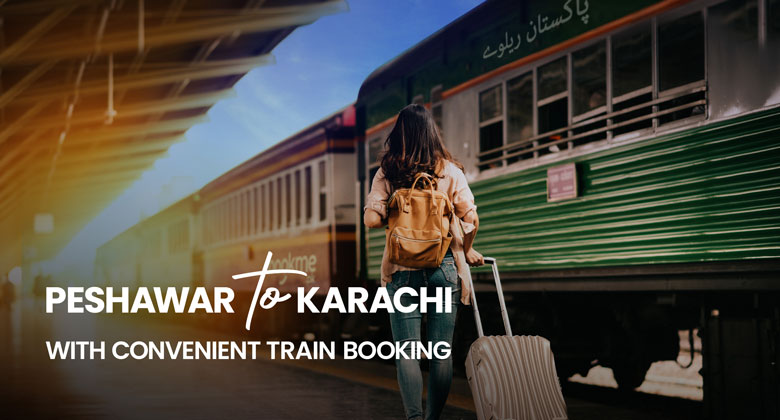
Train Timings
- 37 Up (Fareed Express) ( Karachi City - Lahore Jn. )
Train Timings ( Karachi City - Lahore Jn. )
- 38 Down (Fareed Express) ( Lahore Jn. - Karachi City )
Train Timings ( Lahore Jn. - Karachi City )
- 127 Up(Mehar Express) ( Multan Cantt - Rawalpindi )
Train Timings ( Multan Cantt - Rawalpindi )
- 128 Down(Mehar Express) ( Rawalpindi - Multan Cantt )
Train Timings ( Rawalpindi - Multan Cantt )
- 151 Up Shah Latif ( Karachi City - Mirpur Khas )
Train Timings ( Karachi City - Mirpur Khas )
- 152 Down Shah Latif ( Mirpur Khas - Karachi City )
Train Timings ( Mirpur Khas - Karachi City )
- 16Dn - Karachi Express ( Lahore Jn. - Karachi Cantt )
Train Timings ( Lahore Jn. - Karachi Cantt )
- 15Up - Karachi Express ( Karachi Cantt - Lahore Jn. )
Train Timings ( Karachi Cantt - Lahore Jn. )
- 42Dn - Karakoram Express ( Lahore Jn. - Karachi Cantt )
- 41Up - Karakoram Express ( Karachi Cantt - Lahore Jn. )
- 116Dn - Musa Pak Express ( Lahore Jn. - Multan Cantt )
Train Timings ( Lahore Jn. - Multan Cantt )
- 115Up - Musa Pak Express ( Multan Cantt - Lahore Jn. )
Train Timings ( Multan Cantt - Lahore Jn. )
- 106Dn - Rawal Express ( Rawalpindi - Lahore Jn. )
Train Timings ( Rawalpindi - Lahore Jn. )
- 105Up - Rawal Express ( Lahore Jn. - Rawalpindi )
Train Timings ( Lahore Jn. - Rawalpindi )
- 28Dn - Shalimar Express ( Lahore Jn. - Karachi Cantt )
- 27Up - Shalimar Express ( Karachi Cantt - Lahore Jn. )
- 104Dn - Subak Kharam ( Rawalpindi - Lahore Jn. )
- 103Up - Subak Kharam ( Lahore Jn. - Rawalpindi )
- 8Dn - Tezgam ( Rawalpindi - Karachi Cantt )
Train Timings ( Rawalpindi - Karachi Cantt )
- 7Up - Tezgam ( Karachi Cantt - Rawalpindi )
Train Timings ( Karachi Cantt - Rawalpindi )
- 213 Up Mohenjo Daro ( Kotri Jn. - Rohri Jn. )
Train Timings ( Kotri Jn. - Rohri Jn. )
- 214 Down Mohenjo Daro ( Rohri Jn. - Kotri Jn. )
Train Timings ( Rohri Jn. - Kotri Jn. )
Bookme railway service.
Bookme now providing Railway services in following cities:
- Lahore to Rawalpindi Train
- Peshawar to Karachi Train
- Rawalpindi to Lahore Train
- Karachi to Peshawar Train
- Rehman Baba Express
- Fareed Express
- Subak Kharam
- Rawal Express
- Mehr Express
- Faiz Ahmad Faiz Express Train
- Lahore to Multan Train Timing
- Multan to Rawalpindi Train Timing
- Lahore to Karachi Train
- Khyber Mail Train
- Green Line Train
- Tezgam Train
- Lahore to Bahawalpur Train
- Lahore to Khanewal Train
- Karachi Express Train
- Lahore to Gujrat Train
- Millat Express Train
- Bahauddin Zakaria Express Train
- Shalimar Express Train
- Pak Business Express Train
- Karakoram Express Train
- Pakistan Express Train
- Allama Iqbal Express Train
- Sukkur Express Train
- Jaffar Express Train
- Musa Pak Express Train
- Subak Raftar Train
- Islamabad Express Train
Pak Rail Live Tracking Online
Pak rail live tracking online here for all pakrail.gov.pk trains in Pakistan. Are you tired of waiting at the train station, unsure about the exact arrival time of your train? Fret not, because the advancement of technology has brought a convenient solution to your fingertips – Pak Rail Live Tracking Online. In this article, we’ll delve into the exciting world of online live tracking for Pakistan’s railway system exploring how it works, its benefits, and how you can access it. Say goodbye to uncertainty and hello to a more seamless travel experience.
Contents to Read
- 1.1 Understanding Pak Rail Live Tracking
- 1.2 How Does Live Tracking Work?
- 2 Benefits of Using Pak Rail Live Tracking
- 3.1 Features of Pak Rail Live Tracking
- 3.2 Step-by-Step Guide: Using the Online Tracking System
- 3.3 Tips for Making the Most of Pak Rail Live Tracking
- 3.4 Future Enhancements and Innovations
- 3.5.1 Conclusion
- 4 Frequently Asked Questions (FAQs)
Picture this: You’re at the train station, excited about your upcoming journey, but the uncertainty of when your train will arrive dampens your spirits. This is a common scenario for many travelers in Pakistan. However, with Pak Rail Live Tracking Online, you can bid farewell to this uncertainty and experience a more informed and enjoyable travel adventure.
Understanding Pak Rail Live Tracking
Pak Rail Live Tracking is an innovative digital service that allows passengers to track the real-time location and movement of trains across Pakistan. It provides up-to-the-minute information about train schedules, delays, and estimated arrival times, empowering passengers with the knowledge they need to plan their journeys more effectively.
How Does Live Tracking Work?
At the heart of Pak Rail Live Tracking is cutting-edge GPS technology. Each train is equipped with GPS devices that transmit real-time location data to a centralized system. This system then processes the data and displays it on the online tracking platform. Passengers can access this platform through their smartphones, tablets, or computers, gaining insights into the exact location of their train along its route.
Benefits of Using Pak Rail Live Tracking
- Accurate Arrival Times: Say goodbye to long and uncertain waits at the station. With live tracking, you’ll know precisely when your train will arrive.
- Efficient Planning: Plan your travel itinerary with confidence, knowing the exact schedule of your train and any potential delays.
- Real-Time Updates: Receive instant notifications about any changes to your train’s schedule, ensuring you’re always in the loop.
- Reduced Stress: Eliminate the stress and frustration of waiting by staying informed about your journey’s progress.
Getting Started: Accessing Pak Rail Live Tracking
Accessing Pak Rail Live Tracking is incredibly simple. Follow these steps to get started:
- Visit the Official Website: Open your preferred web browser and go to www.pakrail.gov.pk .
- Enter Train Details: Input your train number and date of travel in the designated fields.
- Track Your Train: Once you’ve entered the details, click “Track” to see the real-time location of your train on the map.
Features of Pak Rail Live Tracking
- Interactive route map displaying train movement
- Train speed and estimated time of arrival
- Information on upcoming stations and stops
- Option to share tracking details with family and friends
Step-by-Step Guide: Using the Online Tracking System
- Visit the Website: Start by visiting the Pak Rail Live Tracking website.
- Enter Train Number: Enter the specific train number for your journey.
- Select Date: Choose the date of your travel from the calendar.
- Track Your Train: Click on the “Track” button to initiate live tracking.
- Real-Time Updates: Watch as your train’s movement is updated in real-time on the map.
- Additional Details: Explore additional information such as estimated arrival time and upcoming stations.
Tips for Making the Most of Pak Rail Live Tracking
- Plan Layovers: Use the tracking data to plan short layovers effectively during longer journeys.
- Stay Notified: Enable notifications to receive alerts about any changes to your train’s schedule.
- Share Your Journey: Keep your loved ones informed by sharing the tracking link with them.
- Enjoy the Scenery: Relax and enjoy the journey, knowing you’re always aware of your train’s progress.
Future Enhancements and Innovations
The future of Pak Rail Live Tracking holds exciting possibilities. Expect to see:
- Integration with popular navigation apps
- Real-time crowd density information for train compartments
- Predictive analytics for even more accurate arrival estimates
Safety and Privacy Measures
Rest assured, Pak Rail Live Tracking is designed with safety and privacy in mind. Your personal information is encrypted, and location data is used solely for the purpose of tracking train movements.
Pak Rail Live Tracking Online is revolutionizing train travel in Pakistan. No longer do passengers need to wait in uncertainty; they can embrace a more informed and stress-free journey. With accurate real-time tracking, planning your trips becomes a breeze, and you can focus on enjoying the scenic beauty of Pakistan from the comfort of your train compartment.
Unlock the power of Pak Rail Live Tracking today and embark on a new era of convenient and efficient travel.
Frequently Asked Questions (FAQs)
- Yes, the service covers a wide range of trains across the country.
- Absolutely, the platform is mobile-friendly and can be accessed on smartphones, tablets, and computers.
- Yes, the tracking data is updated in real-time, providing you with accurate and up-to-the-minute details.
- Yes, your personal information is encrypted and protected, ensuring your privacy.
- Indeed, the service is continuously evolving, with plans for integration with navigation apps and predictive analytics.
Advertisement
Supported by
After Decades of Neglect, Pakistan Rusts in Its Tracks
- Share full article

By Declan Walsh
- May 18, 2013
RUK, Pakistan — Resplendent in his gleaming white uniform and peaked cap, jacket buttons tugging his plump girth, the stationmaster stood at the platform, waiting for a train that would never come. “Cutbacks,” Nisar Ahmed Abro said with a resigned shrug.
Ruk Station, in the center of Pakistan, is a dollhouse-pretty building, ringed by palm trees and rice paddies. Once, it stood at the junction of two great Pakistani rail lines: the Kandahar State Railway, which raced north through the desert to the Afghan border; and another that swept east to west, chaining cities from the Hindu Kush mountains to the Arabian Sea.
Now it was a ghost station. No train had stopped at Ruk in six months, because of cost cutting at the state-owned rail service, Pakistan Railways, and the elegant station stood lonely and deserted. Idle railway men smoked in the shadows. A water buffalo sauntered past.
Mr. Abro led the way into his office, a high-ceilinged room with a silent grandfather clock. Pouring tea, he mopped sweat from his brow. The afternoon heat was rising, and the power had been down for 16 hours — nothing unusual in Pakistan these days.
Opposite him, Faisal Imran, a visiting railway engineer, listened sympathetically to the mournful stationmaster. This was about more than just trains — more than the decrepit condition of the once-mighty state railway service, Mr. Imran said. It was about Pakistan itself.
“The railways are the true image of our country,” he said, sipping his tea in the heat. “If you want to see Pakistan, see its railways.”
For all the wonders offered by a train journey across Pakistan — a country of jaw-dropping landscapes, steeped in a rich history and filled with unexpected pleasures — it also presents some deeply troubling images.
At every major stop on the long line from Peshawar, in the northwest, to the turbulent port city of Karachi, lie reminders of why the country is a worry to its people, and to the wider world: natural disasters and entrenched insurgencies, abject poverty and feudal kleptocrats, and an economy near meltdown.
The election last weekend was a hopeful moment for a struggling democracy, with the party of former Prime Minister Nawaz Sharif winning a huge mandate amid record voter turnout of nearly 60 percent. But the voting left undecided the larger battle against popular disillusionment. In a country forged on religion, Pakistanis are losing faith. People are desperate for change — for any improvement their proudly nuclear-armed government could make, yet has not.
Chronic electricity shortages, up to 18 hours per day, have crippled industry and stoked public anger. The education and health systems are inadequate and in stark disrepair. The state airline, Pakistan International Airlines, which lost $32 million last year, is listing badly. The police are underpaid and corrupt, and militancy is spreading. There is a disturbing sense of drift.
This failure is the legacy of decades of misadventure, misrule and misfortune under both civilian and military leaders, but its price is being paid by the country’s 180 million people.
To them, the dire headlines about Taliban attacks and sterile arguments about failed states mean little. Their preoccupations are mundane, yet vitally important. They want jobs and educations for their children. They want fair treatment from their justice system and electricity that does not flicker out.
And they want trains that run on time.
Peshawar: The Scarred City
At the journey’s beginning, policemen wielding AK-47s guard the train station in Peshawar, on the cusp of craggy mountains that climb into Afghanistan — one of about 40 such checkposts in a city that has long been a hub of intrigue, but that now finds itself openly at war. Since the first Taliban attacks about six years ago, the city has faced a relentless barrage of suicide bombings. No place can claim immunity: five-star hotels and religious shrines, bustling markets and the international airport, police stations and foreign consulates. Hundreds of people have died.
The train system has been deeply affected. Until a few years ago, the tracks stretched up to the storied Khyber Pass, 30 miles to the west, where one of the last steam trains chugged through the tribal belt. Now that line is closed, its tracks washed away by floodwaters and too dangerous to run even if it were intact, given the insurgent violence.
Khyber also gave its name to the country’s most famous train service, the Khyber Mail, immortalized by travel writers like Paul Theroux. It recalls the heyday of Pakistan’s railway raj, when the train was an elegant, popular mode of travel used by the wealthy and working classes alike, with liveried bearers carrying trays of tea, and pressed linen sheets and showers in the first-class carriages.
But the Awami Express, which waited at the platform, had little of that old-world charm. The carriages were austere and dusty. Porters scurried about in tattered uniforms, taking modest tips from a trickle of passengers. Only one class of ticket, economy, was for sale. The train company, lacking generators, could not offer any air-conditioning.
“We are in crisis,” said Khair ul Bashar, the Peshawar stationmaster, surrounded by giant levers that switch the tracks. “We don’t have money, engineers or locomotives. That’s why there are delays.”
The decrepitude of the 152-year-old railway system has, in recent years, been attributed largely to a Peshawar native: the previous rail minister, Ghulam Ahmed Bilour. A classic product of Pakistan’s patronage-driven politics, Mr. Bilour, 73, faced regular accusations of cronyism, using railway resources — money, land and jobs — to look after his own supporters. Meanwhile, service has floundered. Passenger numbers have plunged, train lines have closed and the freight business — the lifeblood of any train service — has crumbled. The last time the rail system turned a profit was in 1974.
Last year the national anticorruption agency placed Mr. Bilour under investigation; a court later jailed two of the railway’s top managers. The minister avoided prosecution, and in interviews has insisted that a lack of funding was the main problem. More recently, though, Mr. Bilour has become emblematic of another aspect of Pakistani politics: the complex relationship with violent extremism.
When Peshawar erupted in deadly riots last October over an American-made video clip that insulted the Prophet Muhammad, enraged protesters attacked the city’s movie theaters, including one belonging to Mr. Bilour’s family. A day later, the minister made a controversial offer: he would pay $100,000 to anyone, militants included, who killed the offending filmmaker. That gesture ingratiated Mr. Bilour with the Taliban, who offered to remove him from their hit list, but deeply shamed his party, which had suffered fatal militant attacks. In Peshawar, people viewed it with irony: the Bilour cinema was notorious for showing racy films that the Taliban surely would not appreciate.
But the cinemas represented more than just Western culture; they were a rare form of public entertainment in a city that is closing in on itself.
Khalid Saeed, the owner of one of the few theaters left standing in Peshawar, the Capitol, sat in the foyer of the once-grand 1930s-era building, surrounded by tatty posters advertising old action movies. Invading rioters broke his projector and set fire to the screen, he said, but mercifully the flames did not spread.
Still, he said, he understood the frustration. “This is about religion, but it’s also about poverty,” he said, sucking on a cigarette. “There’s so much unemployment here. Young people have nothing to do, nowhere to go. You can read it in their faces. They get upset.”
The rattle of Taliban violence has created a stronger curfew than the local police ever could. Mr. Saeed said his son dared not venture out after dark, fearing attack or kidnapping. And still the militants keep striking.
“Around here, nobody knows what will happen tomorrow,” he said with an air of quiet resignation. “What sort of life is that?”
In Mr. Bilour’s case, the entire episode was for naught. A few months later, in December, the Taliban assassinated his younger brother, the politician Bashir Bilour . As election campaigning got under way recently, a Taliban suicide bomber nearly killed Mr. Bilour himself at a rally in Peshawar’s old city. Then, last weekend, he lost his Parliament seat to Imran Khan — the former sports star who has said the government should negotiate with the insurgents, not fight them.
At Peshawar Station, the Awami Express slowly chugged out, brushing against the yawning canopies of gnarled trees and slicing through a crowded clothing market. The clattering grew faster, carriage doors swinging open and shut, as the train rumbled into the countryside. Its passengers — traders, government employees, large families — stretched out on aged leather seats.
Muhammad Akmal, a 20-year-old ice factory worker, was going home to Punjab for a wedding. “Hope to get married myself, soon — perhaps to one of my cousins,” he said. Hopefully, he added, the train would not be too late.
At Attock, the train crawled over a spectacular bridge spanning the Indus River, passing under an ancient hilltop fort built by a Mughal emperor in the 16th century, now occupied by the Pakistani Army.
Sepia-toned images of sweeping train journeys occupy a central place in the Western imagination of the Indian subcontinent, from movie classics like “Gandhi” to the recent “Slumdog Millionaire.” In real life, the Awami Express possessed little of that romance. The 45-year-old diesel locomotive groaned as it belched pillowy black fumes. Fine clouds of dust entered through the open windows. The carriages jerked violently on the corners.
It was not always so. Much as the American West filled out one train depot at a time, Pakistan was forged on steel rails. The state-owned train system, over 5,000 miles of track inherited from the British at independence in 1947, helped mesh a new and fractious country. Trains ferried migrants to the cities, provided a moving platform for campaigning politicians and played a role in the wars against India. It became — and remains — the country’s largest civilian employer, still with more than 80,000 employees.
Today, though, decades of neglect have taken a heavy toll. On paper, Pakistan Railways has almost 500 engines, but in reality barely 150 are in working order. Most Pakistanis prefer to take the bus. Those left on the trains are often frustrated, sometimes mutinous.
Early last year, dozens of protesting passengers laid their children across the tracks in Multan, in southern Punjab Province. They were angry because a journey that should have taken 18 hours had lasted three days — and they were still only halfway to their destination.
In the train engineer’s seat, Hameed Ahmed Rana, a taciturn man in a neat white shirt and a baseball cap, tugged gently on a brass handle and grumbled. The Japanese-built locomotive wheezed and shuddered. “There’s a problem with the oil pressure,” he said. “Not looking good.”
Mr. Rana guided the train into the garrison city of Rawalpindi, headquarters to Pakistan’s military, where artillery pieces poked out from under awnings. Then it pressed south, the landscape flattening as its colors shifted from stony brown to rich green, rumbling past the rich irrigated fields and orange groves of northern Punjab, the heartland of military recruitment.
Inside the train, fans hung inertly from the ceiling as the day’s heat pressed in. The carriages, filling up, were acquiring the air of a village tea shop. Men smoked and chatted; small traders boarded carrying salty snacks and hot drinks; families with women pulled sheets across their seats for privacy.
The conversation, inevitably, turned to politics and religion. An argument about the merits of various leaders erupted between a Pashtun trader, traveling to Karachi for heart treatment, and an engineer who worked in a military tank plant. “We’ve tried them all,” the engineer said with an exasperated air. “All we get are opportunists. We need a strong leader. We need a Khomeini.”
Pakistan, as Seen Through Its Railways
View Slide Show ›
A group of jolly Islamic missionaries, members of the Tablighi Jamaat religious movement, squeezed into a long seat, offering a foreign visitor smiles, a snack and an invitation to convert to Islam. “We’re not on this world for long,” said Abdul Qadir, a rotund man with a gray-speckled beard, proffering a plate of sliced apple. “People have a choice: heaven or hell. So they should work toward the afterlife.”
Lahore: Class and Corruption
Almost on schedule, the Awami Express panted into the grand old station at Lahore. A Hollywood movie starring Ava Gardner was shot here in 1955; today the yard is cluttered with empty freight vans.
Once the seat of Mughal emperors who ruled the Indian subcontinent, Lahore is the center of gravity for Pakistan’s cultural and military elite, a city of army barracks, tree-lined boulevards, artists and chic parties. It is also the headquarters of the 152-year-old railway empire. In the 1960s, Pakistan Railways was said to own one-third of the city’s land, and today the company is still run from a towering colonial-era palace, where clerks scurry between offices down polished corridors.
Up close, however, there is evidence of decline.
At the Mughalpura rail complex — a vast yard of workshops and train sheds stretched across 360 acres with 12,000 employees — workers were operating at 40 percent capacity, managers complained. Electricity cuts bring work to a halt, while entrenched unions, a rarity in Pakistan, stridently oppose any efforts to shed jobs or cut benefits. Unions blame management for corruption; managers say the unions are inflexible. Strikes are frequent.
Outside the plant gates, Muhammad Akram, a railway blacksmith, wore a tinsel garland that showed he was on a “token hunger strike,” from 6 a.m. to 6 p.m. The system was on the verge of collapse, he said: “It’s like sitting on the edge of the sea, wondering when you will fall in.”
The misfortune of the railways has, however, benefited Lahore’s elite. Traditionally, the city’s wealth has stemmed from the surrounding countryside, where feudal landlords live off the rents of poor peasants. For decades, the landlords have epitomized Pakistan’s gaping divisions: paying no tax, treating seats in Parliament like family heirlooms, virtually a law unto themselves on their own lands. But things are changing. Of late, the landlords are being nudged aside by a new elite, one that has found a home in a gilded country club built on railway land.
The Royal Palm Golf and Country Club, a lavish facility with an 18-hole golf course, gyms, 3-D cinemas and cigar rooms, opened in 2002 at the height of the military rule of Gen. Pervez Musharraf. The club, which costs $8,000 to join, has become a showcase for new money: families that made their fortunes from property and industry, contacts and corruption.
The Royal Palm’s glittering social functions, attended by men in expensive suits and women in ornate gowns, are a staple of local society magazines. The opening of a local Porsche dealership was celebrated here in 2005 with a gala dinner featuring exotic dancers flown in from Europe. Some events even offer alcohol, although guests are encouraged to drop their wine glasses when the cameras show up.
“This is a family club, and a lifestyle choice,” said the manager, an architect named Parvez Qureshi, sitting in his stained-wood office overlooking the golf links.
But the Royal Palm was also built on the bones of the railways.
The rail minister at the time was Lt. Gen. Javed Ashraf Qazi, an ally of General Musharraf’s and a former spy chief who leased the railway’s land to a consortium of businessmen. Critics accused him of giving the land away at a sweetheart rate.
“It was not a clean deal. Absolutely not,” said Nasir Khalili, chairman of the Gardens Club, an officers social club with 1,400 members that had to surrender its property.
The National Accountability Bureau, which investigates official corruption, concluded last year that the Royal Palm deal had cost the government millions of dollars in lost revenue.
It was not the first time that the military had chipped at the rail system. Back in the 1980s, the military ruler Gen. Mohammad Zia ul-Haq diverted train freight business to the National Logistics Cell, a military-run road haulage company that cornered the market for transporting wheat and other commodities. Less publicly it smuggled C.I.A.-financed weapons destined for mujahedeen rebels fighting the Soviets in Afghanistan.
“With freight gone, the railway was doomed,” said Salman Rashid , a travel writer who has specialized in the train network.
One evening, a raucous concert took place on the Royal Palm driving green. Thousands of teenagers crowded onto the grass to see Atif Aslam, a popular singer, in a performance sponsored by a cellphone company. Militant violence has curtailed public events in Lahore; most take place in such cloistered circumstances.
Before a crowd of about 4,000 young people, some joined by their parents, Mr. Aslam, wearing skinny jeans and a fur hat, bounded across the stage in a sea of testosterone, fluttering vocals and crashing guitars.
To a foreigner, many posed a rhetorical question that betrayed their wounded sensitivity to Pakistan’s international image. “Do we look like terrorists?” asked Zuhaib Rafaqat, a 21-year-old computer student. “The West seems to think we are. But look at us — we’re just enjoying ourselves, like anyone else.”
Sindh: Abiding Alienation
Charging across lush fields of wheat and cotton, the train crossed into Sindh Province, where it halted at Sukkur, on the Indus River. The Lansdowne Bridge, completed in 1889, spanned the water — one of several feats of engineering by the British colonialists who hacked through mountains, traversed ravines and cut across deserts to make a railroad in what has become Pakistan.
The railway project was foremost a tool of occupation: first to transport cheap cotton to English factories, later to move troops toward the northwestern frontier to guard against invasion from czarist Russia. Tens of thousands of construction workers died on the job, perishing in blistering summers and freezing winters, or from diseases like scurvy and malaria.
South of Sukkur, waterlogged fields mark a modern calamity: the 2010 floods, which inundated about one-fifth of the country, affected 20 million people and caused up to $43 billion in economic losses, according to some estimates. Topsoil and entire villages washed away in muddy waves, never to return.
In the Awami Express’s grimy dining car, a cook named Amir Khan stirred a greasy chicken broth over an open flame, then flopped onto a stack of soda crates. He gestured to the flood-scarred landscape.
“Zardari will show this to America, so that he can get some money,” Mr. Khan said with a cackling laugh, referring to President Asif Ali Zardari, who comes from Sindh. The cook wiped a mug clean, then paused reflectively. “Maybe if Benazir were alive, things would be different.”
The assassination of former Prime Minister Benazir Bhutto in December 2007 was a traumatic event for Pakistan, but also for its railways. Enraged supporters attacked 30 train stations across her native Sindh, burning 137 coaches and 22 locomotives in a sulfurous protest at the failure of the state to protect Ms. Bhutto.
Still today, the trains present an easy target for disgruntled Pakistanis. As the Awami Express pushed south, the railway police passed through the train, brusquely searching passengers and their luggage. The police increased railway security after Baloch separatists exploded a small bomb at Lahore Station last year, killing two people. More recently, ethnic Sindhi separatists have singled out the train lines for attack.
Sindh is the hub of Pakistan’s Hindu population, which, like other minorities, has suffered from deepening intolerance in recent years. Stories of forced conversion of Hindu women at the hands of Muslim zealots have caused media scandals; last year some Hindu families, complaining of prejudice, left for India. But they were an exception: most Hindus remained behind, and some are quietly thriving.
At the southern city of Hyderabad, a train branch line jutted into the desert, toward the border with India. This was Thar, a desert region where, unusually, Hindus are predominant. A rural commuter service — a train with open doors and a handful of seats — ambled through irrigated farmland toward the desert. On board were farmers, small traders and pilgrims returning from a Hindu shrine, the bareheaded women adorned in gold and silver jewelry.
At the district’s main town, Umerkot, the local colony of snake charmers lives in the shadow of a clay-walled fort. The chief snake charmer, wearing a bright red turban and playing a flute, entranced a cobra as it curled from a wicker basket. Later, he produced a government certificate that attested to his ability to “perform a dangerous act of passing three-foot snake from nostril and mouth.”
“Half of our people are in India,” he said afterward, pointing toward the desert and the border. “But we feel ourselves 100 percent Pakistani.”
Karachi: The Slum Patriot
Land is gold in Karachi, Pakistan’s tremulous port megalopolis: a city of migrants, filled with opportunity and danger, where space is at a premium that is often paid in blood. Political parties, mullahs, criminal gangs and Taliban militants all battle for land in the city, often with weapons. The railways offer an easy target.
Slums crowd the train lines that snake through the city, pushing up against the tracks. Migrants have been coming here for decades, seeking economic opportunity or, more recently, fleeing Taliban violence.
A short walk from Karachi’s main train station lies Railway Colony Gate No. 10: a cluster of rough shacks, pressed against a slope, bordered by a stagnant pool of black, putrid sewage.
Among its residents is Nazir Ahmed Jan, a burly 30-year-old and an unlikely Pakistani patriot.
Mr. Jan, known to friends as Janu, is from the northwestern Swat Valley, where fighting erupted in 2009. After the Taliban arrived, his family fled Khwazakhela, a village “between the river and the mountain,” which he described with misty-eyed nostalgia: lush fields, soaring mountains and his family’s grocery store, later destroyed in fighting.
In contrast, Karachi is gritty and ugly, he acknowledged. He made his money selling “chola” — a cheap bean gruel — as he guided his pushcart through the railway slum. It earned him perhaps $3 a day — enough to feed his two infant children, if not much else.
But Mr. Jan was an irrepressible optimist. At least Karachi was safe, relatively speaking, he said. And it had other attractions.
In the corner of his home was a battered computer, hooked up to the Internet via a stolen phone line. He used it to write poetry, mostly about his love for Pakistan, he said, pulling out a sample. One couplet read:
“If you divide my body into 100 parts /a voice will cry from each one: Pakistan! Pakistan!"Mr. Jan’s face clouded. He had contacted national television stations, and even the army press service, trying to get his work published, he said, folding a page of verse slowly. But nobody was interested; for now the poetry was confined to his Facebook page.
“I just want to express my love for my country,” he said.
Distrusting politicians, he harbored a halcyon vision of what Pakistan could become: a country that offered justice, free education and health care, where leaders made the people wealthy, and not the other way round. “That would be the Islamic way of serving the people,” he said.
Mr. Jan smiled and, clasping his hands across his chest, excused himself. He had to work. The mountain migrant vanished down the street behind his pushcart, children scurrying around him. He whistled a Pashto folk tune, his soup jostling in the cart.
From the distance came the sound of a hooting train, pulling into the station. It was surely late.
An article on Sunday about Pakistan’s crumbling railway system and the challenges facing the country misstated the term that is applied to members of a group of Islamic missionaries. They are members of Tablighi Jamaat; they are not known as “jamaats.”
How we handle corrections
This article was reported and written before Declan Walsh’s expulsion from Pakistan by the Interior Ministry on May 10.

IMAGES
VIDEO
COMMENTS
Finding the right train in Pakistan. First things first: if you want to travel by train, you need to find the right train for your journey. To do this, go to the website of Pakistan Railways. Here, you'll be able to find your train under the "plan your journey" section of the page. Although getting to the information you want is a bit ...
Check times at www.pakrail.gov.pk. Train 1/2 = The KHYBER MAIL, most famous train in Pakistan, recommended for Karachi-Peshawar journeys. Train 7/8 = TEZGAM, recommended for Karachi-Rawalpindi journeys. Train 15/16 = KARACHI EXPRESS. Recommended for Karachi-Lahore journeys. Train 27/28 = SHALIMAR EXPRESS. Recommended for Karachi-Lahore journeys.
Taking a huge 24 hour train journey across the entire country of Pakistan!-My INSTAGRAM: http://indigotraveller.space/Instagram-Music used in my videos (Free...
Pakistan Monument. Quick Guide. What are important travel tips? How many days in advance can I book my ticket? What are different concession provided to railway passengers? How do i find check the current status of my unconfirmed ticket? Are there any car parking facilities at stations?
Train : 10DN - Allama Iqbal Express 9UP - Allama Iqbal Express 202DN - Attock Passenger 201UP - Attock Passenger 14DN - Awam Express 13UP - Awam Express 112DN - Badar Express 111UP - Badar Express 26DN - Bahauddin Zakria Express 25UP - Bahauddin Zakria Express 349UP - Chaman Mixed 38DN - Fareed Express 37UP - Fareed Express 5UP - Green Line 6DN ...
Pakistan Railways - pakrail.gov.pk
Pakistan Railways is a state-owned railway company. You can know the Pakistan railway timing, list of trains, Pakistan railway online ticket price, and Pak railway live updates at UrduPoint. Pakistan railway timetable details and schedule of all trains, including their origin, destination, stations, route, online railway booking, and Pak ...
A big fan of Pakistan Railways. Here I will upload some of the best videos related to Pakistan Railways and Pakistani trains. ... Become a sponsor & support my journeys to explore Pakistan & its ...
Pakistan Railways is a state-owned enterprise under the Ministry of Railways (MoR) of the government of Pakistan, tasked with and primarily responsible for planning, administering and establishing passenger rail service and regulating railway companies and industries.Pakistan Railways policy and development are administered by the ministry. From 1947 to 1959, the Pakistan Western Railway and ...
A Travel Guide For Train Travel In Pakistan. Here you will find information for Pakistan about trains, routes, tours, connections, where to buy train tickets, and more. [shariff] Useful Information. Population: 216.6 million. Currency: Pakistani Rupee. Language: Urdu. Capital: Islamabad.
The journey between Karachi and Multan alone took up to 40 days. The company had its headquarters in Kotri, and its promoters negotiated the same guaranteed rate of return as the original guaranteed railways. ... Pakistan Railways (1947-present) After the independence of Pakistan following the partition of British India, 5,048 route miles ...
It is advisable to check the guidelines provided by Pakistan Railways before your journey. Q. What are the popular routes for scenic train journeys in Pakistan? A.Some of the popular routes for scenic train journeys in Pakistan include the Lahore to Rawalpindi route and the Quetta to Lahore route. These routes offer breathtaking views of the ...
Travel time Gauge Karachi-Peshawar ... Pakistan Railways is working on plans to construct a 635 km standard-gauge line from Quetta to Taftan on the Pakistan-Iranian border. The proposed railway would support the transport of high-value goods to Europe and Central Asia. Trains on the Islamabad - Tehran - Istanbul route currently take ...
At the time of our travel by train in Pakistan we understood that the Greenline from Islamabad to Karachi had three options for class of travel: Economy Seat. Economy Berth. AC Business Class. We booked an AC Business Class cabin (which actually has six berths in). Our 6-Berth cabin in AC Business Class.
If you're planning to travel by train in Pakistan, it's a good idea to follow these steps to obtain the most accurate and up-to-date information: Visit the Pakistan Railways Website: The official website of Pakistan Railways is a valuable resource for finding train schedules, routes, and other important information. ...
Install "Pakistan Railways" android app and be a part of journey because we are always moving 24/7. Now anyone with Android phone can easily book a railway ticket anywhere in Pakistan within 3 minutes. Don't forget to watch our video tutorial as a user guide for this app. Thanks 1. One Step Login To Existing Website Users 2. Search & Book Train ...
Watch the interesting details of traveling n Pakistani Trains in this video.Thanks for watching Big Bhai.Please Subscribe my channel.-----...
Allama Iqbal Express Train. Sukkur Express Train. Jaffar Express Train. Musa Pak Express Train. Subak Raftar Train. Islamabad Express Train. Rehman Baba Express. BookMe feels honored to provide train tickets booking online in Pakistan, now you can do your railways booking easily at your fingertips.
Welcome guys! Today we are FINALLY riding our first ever sleeper train in #PAKISTAN .We will be travelling on the GREEN LINE AC SLEEPER BUSINESS/FIRST CLASS ...
Pak Rail Live Tracking Online is revolutionizing train travel in Pakistan. No longer do passengers need to wait in uncertainty; they can embrace a more informed and stress-free journey. With accurate real-time tracking, planning your trips becomes a breeze, and you can focus on enjoying the scenic beauty of Pakistan from the comfort of your ...
Khyber Mail (Urdu: خیبر میل) is a passenger train operated daily by Pakistan Railways between Karachi and Peshawar. The trip takes approximately 32 hours, to cover a published distance of 1,764 kilometres (1,096 mi), traveling along the entire stretch of the Karachi-Peshawar Railway Line. The train named after the famous Khyber Pass, located in the province of Khyber Pakhtunkhwa.
A journey across Pakistan's crumbling railway presents a picture of the country's troubles: natural disasters and hardened insurgencies, abject poverty and feudal kleptocrats, and an economy ...
Travel by Train Pakistan Railways Journey Balochistan from Sibi Railway junction Railway Station to Quetta Railway Station 2020. I'm traveling in Pakistan. M...